#not... the world's most nuanced meta on this subject
Text
That cool bee book I was talking about a while ago mostly refrains from philosophical digressions (which I think is a strength, I appreciated how the author had total confidence that just clearly presenting the facts about his subject would be enough to make a fascinating book without the need for any "...and here's why that should blow your mind" editorializing, and he's totally right), but there was one towards the end I've found myself thinking about a lot, which is: he wants people to stop using "self-consciousness" (i.e. the concept exemplified by the mirror test but used implicitly or explicitly in tons of other contexts) as a criterion for which animals can be considered sentient/morally relevant/having significant inner lives/however you want to describe it. Not, as you might expect, because he thinks it's an unreasonably high bar to meet, but because it's such a low bar that it produces no distinctions: he argues that basically any animal with any kind of developed central nervous system has to have some kind of self-consciousness almost by definition.
The example I remember best is: imagine you can see an object in your visual field getting closer to you. No matter the specifics, it's obviously always going to make a huge difference to how you evaluate this situation whether the cause of the object getting closer is a] the object is moving towards you, or b] you are moving towards the object. If a, then something might be pursuing you or falling on you or a thousand other things that are just not even worth considering in the case of b. But visually the two cases are indistinguishable; if you're going to be able to track the difference, your brain has to be putting at least some work into keeping tabs on what your own intentions are and what choices you're making as you move through the world, predicting the expected consequences of those choices, and maintaining a fairly tidy mental separation between stuff in the world that you're making happen and stuff in the world that's just happening of its own volition. Otherwise, every time you walk towards a rock you'll freak out and think the rock is rolling into you, or vice versa.
And it's not hard to see how this applies to your entire sensory world right, it applies to sounds and tactile sensations and even feelings internal to your body to some extent, if you're going to both perceive the world and take actions in the world then it's mandatory to mentally separate yourself and the world before that's going to yield even an ounce of helpful information, you just can't function successfully on the most basic level if you're processing stuff that you're doing on the same level as stuff that's happening, if you're in that state then you simply don't have a usable model of the world at all, you just have chaos.
So you can very easily eliminate a certain seductive narrative about the evolution of consciousness, which starts with very primitive animals who are mentally processing nothing but basic sensory inputs, then as you rise up the chain more complex animals are forming concepts of objects and building up a more nuanced understanding of the world, until finally you approach humans and the mind becomes so subtle and sophisticated that it gains access to this special advanced meta-level of thought where it can even understand itself! No, the self is precisely the one idea that has to be in place from the very beginning, before any of it has even the most rudimentary practical value. Self-consciousness isn't the pinnacle of the mind's evolution, it's one of the lowest, most basic foundations that everything else builds off of.
I think this is really cool stuff! I don't know enough about the relevant academic philosophy of mind debates to say how far all this does or doesn't speak to that, maybe someone will tell me the "self-consciousness" concept being attacked here is a strawman somehow, I don't know. But it's definitely impacted the way I (just a dumb guy who likes creatures) think about our small small cousins and what their lives might be like and I think it's super interesting. If you think it's interesting too then maybe you wanna buy The Mind of a Bee by Lars Chittka and read it. It's mostly not about this stuff, as I say it's light on philosophy and heavy on bee-life immersion, but if you actually read this whole post then you're probably in the market for that I feel like.
#creatures: they've got a lot going on#I think we'd better just let them get on with it#nohopereadio#uninteresting
979 notes
·
View notes
Text
I've seen the same post a hundred times now. Sometimes it's a few days old, sometimes it's from years ago, but it's always the same. Some anti posts about how they don't understand how anyone can like Snape because he was so awful, and then there's a long reply that goes something like, "imagine this happens to you, and then this, and then this" to describe Snape's experience. Sometimes there's some James Potter hate thrown in.
Look. You can go through describing a character's entire experience but you don't really need to. Here's the thing that antis don't understand:
For all her faults (and they're big, bigoted ones) Rowling understood a really integral part of the human experience and conveyed it through Snape. Everyone needs love and to feel accepted. It's that simple. Snape became a Death Eater to seek acceptance (Rowling has confirmed this, though I can't remember the source - whoever wants to add it please do), because it was the only way he could find any.
Snape's understanding of morality, like everyone's, is subjective. Some readers understand this and some don't. When faced against a morality that says there is good and bad in the world, everyone makes choices based on their personal experience. Context is everything. Someone who experiences pain and suffering will not see the person inflicting it on them as moral. That's it. 'How can this person be good when they caused me so much suffering?' = human psychology. Most of the people who think 'I'm a bad person and deserve this' have been gaslit and abused into thinking so, because it's not a natural reaction - it's one that has to often be socialized into someone at a young age, exactly because it's not natural. Everyone is the hero of their own story; no one sees themselves as a villain, because they see the valid aspects of their own perspective.
You can write essays on how vulnerable people needing acceptance is what cults and fascists exploit to recruit vulnerable people, or on how the standard anti's un-nuanced reading of Snape both ignores canon and displays a disturbing lack of empathy or compassion, but at its core it just boils down to context. From Snape's perspective he experienced cruelty, therefore the people inflicting it must be cruel. Again, it's that simple. He was a person, like any other, except he was fictional so he wasn't even real. On the flip side is James Potter, who, for all his faults, didn't get to live long enough to get a chance to change and grow unlike Snape, and I think the Snapedom also needs to acknowledge that.
They're fictional characters representing things an author wants to say, not sports teams, not martyrs, and not all good or all bad emblems that define your identity depending on how you feel about them. It's depressing how much time is wasted arguing with bullies and trolls whether from the Marauders fandom or just random antis. I literally can't find more than three blogs to follow without this argument coming across my feed daily. I know the Snapedom is Not OK™ and that's kind why we're all here, and I know that my take is super unpopular but like Snape, I don't care what others think: this fandom has been having the exact same argument for years and nothing has changed. There's fanart and meta and fic and so much content out there appreciating this character, you're not going to change an anti's mind who's deliberately trolling in the tags, so why are you trying? What are you getting out of it? What does it give you? It's exhausting just scrolling past it.
#The thing about morality is that it's subjective#the religious leader who's a beacon of moral purity to their congregation#is a source of selfishness and pain to someone they abuse in secret#is that abuse victim immoral for rejecting the values the religious leader represents?#the congregation might think so because their definition of morality relies on the religious leader being a moral guide#the victim might not think so though because how can something be righteous if it causes suffering#look this is just an example of how perspectives can vary and I know there are more possible takes on that example#my point is that the idea that there's no clear 'good' and 'evil' there's only power/what you do with it is actually how psychology works#'good' to one person can be pain to another#'scourgify' is an innocuous household spell that cleans stains until it's used to waterboard someone#context matters more than labels like 'light' and 'dark' magic
46 notes
·
View notes
Text
DEVIL HOUSE by JOHN DARNIELLE (REVIEW)
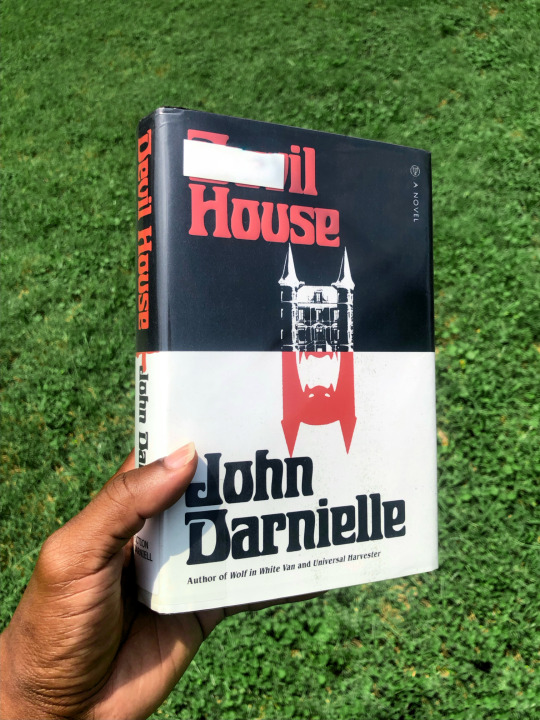
quickly: a true crimes writer moves into the building where the murders in his latest book took place (a writer questioning the ethics of his process / the past catching up with the present / lasting works of art / stories about stories / small towns outside of big cities / housing, drug, and mental health crises / mothers who love their sons / SATANIC PANIC! / swords, knights, and castle doctrines / the monsters are the people, but are the people monsters?)
This is not horror and hardly a thriller. There are no ghosts, demons, or spirits. There are indeed bumps in the night, but they come from the living. It’s a fresh take on mystery writing, but not really mystery either. It’s an exposition. We follow the main character, Greg, as he completes his latest true crime novel. The voices change throughout the story, so sometimes Greg is speaking to us, other times to someone else. The fun part of this story is the writing and the behind-the-scenes peek into the world of true crime. The not-so-fun part is the ending.
John Darnielle’s writing spirals and descends. He takes his time moving around the subject, encircling it with details, getting closer and deeper at the end of every paragraph. Then, as you are rounding the last bend, the entire picture becomes clear from the inside out. It was like unraveling a beautifully woven ball of yarn, expecting a rare jewel at its center, but finding the end of a string instead. (Maybe, this is the entire meta point of this story… life is just a series of strings ending. Nothing special.)
★ ★ ★ ★
more thoughts: SPOILERS
Some personal context… I came across this one because I was scouring the goodreads tag for “horror” and looking for interesting things that came out in the past year or two. The cover got me, as they tend to do. I rarely check the reviews before I read the story, but I always check after, just to see what there is I might have missed. I think I liked it more than most. As interesting as this book was to read, it didn’t deliver the THRILL I thought it would. It read like a poet writing a Wikipedia page… an intricate balance between truth and perception and the philosophy of cause and effect.
I recently read TROOP, and one of my gripes was the dialogue for the young teens that the story centered on. It felt so outdated and inauthentic. The dialogue, actions, and inner monologues for the teens at the center of DEVIL HOUSE were immaculate. Perfectly nuanced, and varied. The sophisticated unraveling of emotions and motivations is moving. He totally encapsulates the angst of aging. Now that I think about it, I actually would’ve loved to have seen John Darnielle do a version of TROOP.
The story is divided into 6 parts, and they each have different voices.
1: Chandler
We open with our good friend Greg Chandler, whose family lineage of kingship becomes a recurring thematic element in this story. He introduces us, right off the rip, to who he is, what he does, and his latest project. His agent has hipped him to the story of a couple of people murdered in an old porno shop in Milpitas, CA, outside of San Jose.
He walks us through his process… one of immersion, invasion almost, that requires him to be in the places where these crimes took place. He, again with a nudge from his agent, devises a plan to purchase ‘DEVIL HOUSE’, which has been renovated, turned from a shop into a home, and is currently for sale. As he goes through the process of buying the house and moving in, he takes time to expound on the details of the case. He gives us an introduction to necessary persons and places, and at the end of Part 1, he tells us that what he discovered differs from the story that is told. He also tells us that he does not want to write the story he was sent there to write.
2: White Witch
Here, the story changes abruptly. Now, our narrator is no longer talking to us. Now, attention is directed to ‘The White Witch’, and we have become the ‘White Witch’ being addressed. (An interesting use of narration perspective, though I understand how some could find it jarring and confusing.) Eventually, we will come to know her life… a high school teacher who murdered two students while they were invading her home. Part 2 is a grand spiral around the details of her life leading up to the invasion and murder. In the open, she was just a school teacher. In the end, standing on the beach with bags of body parts, she has turned into the satanic WITCH living in the hills. Both in some real reality, but also in the minds of those always needing a villain to blame the evils of the world on.
3: Devil House
Our narrator returns to addressing us, and the White Witch’s story is paused. Now the focus returns to Milpitas, to Devil House before it was known as such. We get a grand historical overview of the influences that conspired to make the porno shop possible. This includes the history of the land and the landlord. However, the bulk of this part of the story is about the last occupants of Devil House, before our narrator Greg.
We go back to it when it was MONSTER ADULT X, a porno shop on the side of the highway where 17-year-old Derrick works, unbeknownst to his parents who only want to best for him. MONSTER ADULT X (I’ll refer to it as MAX from here on out), is in its last days as the owner Anthony Hawley can’t keep up the rent payments.
Hawley closes the place down, but because Derrick still has his key, it is open to him. He hangs out there drawing and sketching. Then his friend Seth starts joining him. Then their homeless friend Alex, who’s been missing for some time joins them and lives there. Just at the tail end of things, Alex’s friend Angela pops in for some of the fun.
This is their paradise, away from the impending world of adulthood and all its anxieties and broken promises. Things are fine until the landlord starts showing the place, in preparation to sell.
4: Song of Gorbonian
A short and unexpected chapter, written in Olde English. Obviously, this is an imaginative prelude for some of the story’s later motifs and actions. Yet, it could just as well be a short story written during a reprieve Greg was taking from writing Devil House… or a rambling from one of MAX’s occupants during its last days… who’s to say? The Song of Gorbonian is a tale of a young king’s promise to avenge his father’s death and restore the gods of the old world.
5: Devil House
In this part of the story, Greg updates us on the stories of MAX’s occupants. He catches up with modern-day Angela, Derrick, and Seth, all living different adult lives far away from Milpitas, having escaped any punishment, (but receiving tons of blame for the murders). The only one we don’t get an update on is Alex, who has managed to disappear.
6: White Witch
Now we are back to the story of the White Witch, but not like before. Instead of standing in her place while Greg speaks to her, we are instead placed in the shoes of Jana, Jesse’s mother, one of the kids killed by Mrs. Crane, The White Witch. We are standing in Jana’s shoes as Greg reads (or summarizes rather) a letter Jana wrote. In reading this letter back to her, we come to understand the forces that shaped the life of the home invaders we met in Part 2.
In between the breaths of this letter, Greg is restoring Devil House to its former glory… breaking glass and pulling up carpets.
7: Chandler
The perspectives change again. Now we are standing in the shoes of Greg’s childhood friend, as we reconnect with Greg after several years and he expounds on the new project he is working on, writing about a murder in Milpitas where he (we?) grew up. At the close of Part 7, we learn that this has all been a fabrication. Derrick, Seth, Angela, Alex… not one of them was real. At least, not in the form that Greg portrayed them to be in his book. The real culprits were likely men living on the streets, squatting for the night, running into the landlord, and reactions ensuing.
Greg reveals his grand philosophy on what the public expects from true crime, and how the true story of Devil House would not satisfy the psyches of the consumers. Then the book fades out in a hazy memory of childhood, where the days were spent playing games.
Before I could complain too much about the ending, I had to remind myself that Greg told us exactly to expect: “What I learned contradicts the account I first read, which I understand to have sprung from the need for a certain sort of telling, a hunger for known quantities.” In other words, the salacious story of teens murdering to defend their clubhouse is something cooked up by the collective psyche, not by reality.
More than a fictional true crime book, this entire work seemed to be a rumination of the big machine of true crime itself and how we respond to these violent acts as a society. What do we want from these stories? Who do these acts of violence affect? At one end of a story, a person may look like a demon, but if we trace back all the influences and occurrences, we may find this person may have been someone else at some point… and if it is true that they were someone else, how much responsibility do we place on all the option-less choices people are forced to make, and on the uncontrollable forces that shape the boundaries of our lives?
#devil house#john darnielle#4 stars#fiction#review#books & libraries#currently reading#book review#booklr#booklover#booksbooksbooks#bookworm#literature#reviews#2023
8 notes
·
View notes
Note
3, 5, and 34? For the ask meme.
3) Minor character people in the fandom are obsessed with that makes you go "them? why?"
I actually answered this one last because I had to think about it, but I don't think there is a minor one that I have that feeling toward, but in the fun of drama I will say I don't get the obsession with Lucien outside of just, like, usual villain = hot stuff. However I wouldn't consider Lucien a minor character. I think any obsession with minor characters make the most sense because we have so little to go on so its easy to want more.
5) Meta you would write if you did not fear people would be SUPER weird about it. This is also an invitation to write that meta and block the haters.
I have a lot to say about the way m9 treated Caleb that involves a lot of discussions of ableism but also nuanced with the idea that our loved ones can love us but still make harmful assumptions. There is one character in particular that I have a lot to say about and would argue the 'love' point on, in fact. I would maybe write it all out some day, and i've talked to people about this subject directly before because its actually kind of interesting to me. But people are never normal with separating that kind of opinion from the cast themselves or from their own headcanons/faves and I don't actually enjoy shitting on other people's fun.
34) You meet an old woman in the grocery store and help her with her bags. In return, she tells you she can guarantee that Campaign 3 will be fantastic, and that there will be a Campaign 4 set in Issylra that is also fantastic. However, she warns you, the price is that Marisha and Laura's characters will never be in a romance together, nor will Taliesin and Liam's, though there will be significant queer romances aplenty, both F/F and M/M, in said campaigns. Do you take her up on her offer?
Lmao I actually did kind of want to answer this one :P 100% I would take her up on that offer SO fast. I'd ask her if there was anything she needed to MAKE SURE it went down that way, tbh. In an ideal world I would watch the CR cast do any romance anytime no matter the pairing but we live on Tumblr where nobody is normal about anything, especially not those ships.
9 notes
·
View notes
Text
Moving Pictures
One thing I'm really enjoying about this project is the opportunity to really consider each book. Most of these I've only read once, as part of one whirlwind hyperfocus dash or other, but the reviews force me to focus on each book one at a time.
Moving Pictures
First Read: High School
Verdict then: Good book, now where's the next one?
Verdict now: A funny, loving, and well executed parody/takedown/homage to Hollywood and movies. You can see a lot of growth as a writer since the conceptually similar Wyrd Sisters.
Despite having read it before, I didn't have any real expectations coming into Moving Pictures. It was one of those books that I read in my first dash through Discworld, borrowing from a couple friends who had them, and got lost in the middle of the dozen or so volumes I devoured in hyperfocus. But I really enjoyed Moving Pictures. Guards, Guards still stands as my favorite so far, but Moving Pictures gave it a run for its money.
I'm a terrible sucker for meta-narrative fuckery, and Moving Pictures has that in spades. The concept of movie reality leaking into the real world, and horrors from beyond being bound by the rules of that manufactures reality is basically catnip for me. Several of the characters are also amazing: Gaspode, Throat, Soll, Bursar, Ridcully all get some great lines and moments. The biggest weakness is ultimately the two leads: Victor is (intentionally, I think) that very bland kind of movie star archetype, and Ginger shows that he still hasn't quite figured out how to write women yet. They don't really seem to have chemistry outside of the set, Victor's attraction to Ginger doesn't seem to go any farther than skin deep, and Ginger has little agency for much of the story. I end up not really believing in their romance.
But oh man, this book is really funny. I mean, I did write a research paper on movies between sound and color in the 8th grade, and haven't lost my love for movies of all eras since, and so one could accuse me of being squarely in the center of the target audience for the humor. But so much of the humor transcends the subject matter. Did I get a good chuckle out of the twisted inversion of a giant woman carrying an ape up a tower and getting shot by two wizards on a broom? Yes, absolutely. But the visuals of the handleman, Ginger, and a dozen wizards frantically riding a giant wheelchair moving at the speed of travel montage? Pure comedy, no additional context needed.
The true heart of this book lies with Gaspode. He carries such human trauma, of one who has been rejected so much that he invites it, almost requires it of those around him. How he grows, learns, and ultimately chooses who he really is over the course of the story. The healing that his unlikely friendship with Laddie brings him. The climactic moment in the theater. He got me at the end too - I really thought Pratchett was going to go through with "the dog dies at the end", but I'm glad he didn't. It wouldn't have fit right with the rest of the story.
Moving Pictures is also a masterclass in how to be broad and focused at the same time. There's a lot that goes on in this book beside the A plot of Victor, Ginger, and Osric - Silverfish & Throat, Throat & Soll, Detritus & Ruby, Gaspode & Laddie, the wizard council, Bursar & Ridcully, the movie palace owners, the troll actors whose names escape me, more I'm sure that I'm forgetting. And yet, the singular frame of "speedrunning Hollywood history through Gone with the Wind" allows all of these pieces to come together into a greater whole. The side stories don't feel like diversions, they feel like valuable asides, painting a richer and more nuanced picture of the humanity & Trollanity behind the dreams of Holy Wood.
Speaking of Trolls, he starts here what I know will be a slow project over several more books, of taking Dwarves and Trolls and turning them into object lessons in the harm of stereotypes. Not by preaching, but by the route of giving them depth & humanity while retaining the pieces that caused them to be stereotyped in the first place. To my eye, his treatment of Trolls here has also maintained a useful distance from reality that the Tecumen in Eric or the Klatchians in Sourcery or Twoflower didn't - the Trolls aren't coded as a specific Earth culture, and so there's less baggage brought in by the reader. It lets the messages of complexity and variety slip under the defenses better.
Moving Pictures is a tremendously successful send up, homage, and skewering of Hollywood culture. With great characters, a breadth that lenses into a singular focus, and with the best physical comedy scenes yet in the series, it really feels like Pratchett is starting to hit his stride. Two decades after my first Discworld book, I'm still so excited to read the next one.
3 notes
·
View notes
Text
Today I was reading some HalBarry fic because last night I remembered that one A Flashlight To See In The Dark which had me GRIPPED during high school but it has not been updated since 2018 😞😞 so anyway I was trawling through random fics & Hal and Barry were geek-arguing about best Star Trek captains, obviously Hal favors Kirk because like most impulsive maybe-closeted bisexual men he thinks he is Him, & Barry was like "no it's a tie between Picard & Janeway" & started descriptively lauding both & I instantly said HEYYYY NOW THERE'S NO WAAAAY because racism in many fandom spaces is so extreme yet normalized that bitches would have oneself believe that those are the only ST captains of note or ST captains PERIOD when Captain Benjamin Sisko is by far no contest one of the best ST characters of all time as well as leagues beyond any other captain in the franchise 👾👾 obviously we each have our own personal preferences & experiences which are fun & subjective & tied to our own unique lives, and also obviously Captain Sisko is deeply tied to my enjoyment of Star Trek, and another obviously is that the act of fighting over best captains is so silly. But there has always been an insidious dripdown from White Supremacist society at large into what are meant to be creative explorative & welcoming spaces for all peoples, which disturbs & distorts the true intentions & impact of storytelling media and colonizes transformative art into weapons of conformity & suppression. Sisko is a philosopher in the way that the smartest & kindest people in life are, he is a talented chef that cooks family dinners for his loved ones, he is a leader & listener and mediator & menace to fascism, he is a both a spiritual & physical fighter who provides his powers to the most marginalized groups in the galaxy, he is progressive & patient & best friends with the first openly-queer character at the time Jadzia Dax, not to project but he's autistic as HELL, he deeply loves freedom & peace & justice & his friends & his son & his father & his wife & his partner and is a caring present & competent Black male role model and father figure on TV in the 90s during a time where his actor Avery Brooks himself was subject to horrible racism & harassment in his daily life and had to fight the studios to portray Sisko in the nuanced inspirational human way that Avery Brooks CHANGED LIVES DOING!!!! SEASON 6 EPISODE 13 FAR BEYOND THE STARS!!!! 😵💫😵💫😵💫😵💫 OH MY GOD!!!! Captain Benjamin Sisko is a pillar of the Star Trek universe who changed the trajectory & expanded the scope of canon, through his leading role on DS9 spearheading numerous deeply meaningful explorations of sentient living & our responsibilities to each other as interconnected living things, which sparked in-universe epic political movements as well as real-life inspiration & activism. Sisko is on his own GOATED 🐐🐐🐐🐐 but also is a beautiful impactful figure in the cabinet of legacies among which all Star Trek captains lay!! In giving Sisko his laurels we aren't putting down any other captain since they all serve the same function (in-universe, leading their crew family into boldly-going adventures across the stars; meta, leading the ensemble of characters as well as the audience throughout moral dilemmas & lessons about life & allegorical activism that we take with us into our own world)-- THE PROBLEM IS THAT HE IS NOT GETTING HIS LAURELS & THAT THOSE PEOPLE DON'T WANT TO GIVE HIM HIS LAURELS BECAUSE HE IS BLACK!!!! This is White Supremacist dogma infecting the splendors of Star Trek (yet again 🙄🙄) by getting into people's minds that Sisko is inherently less as a person & a captain as well as in impact & importance because he doesn't conform to WS physical & political conformity. I HATE IT ☠️☠️☠️☠️ it is a pattern of Black people, creatives & leaders & sociopolitical activists, EVEN FICTIONAL ONES being erased from the narratives they created & enriched through immense beautiful craftmanship of reality so that WS can keep deluding itself that conformity & bigotry is the endallbeall of existence.
1 note
·
View note
Text
Worldbuilding Exchange Letter
General Likes:
Worldbuilding and subject matter expertise! All the worldbuilding. I literally have 100K and counting of Chicago-cited, JSTOR articles and all, worldbuilding on the historical/political background of the wizarding world for the fic series I'm working on. I also adore small, lived-in details – so if there’s any particular expertise/personal experience that you’ve always wanted to expound on, consider me a captive audience haha. I’ve literally done method writing for a fic where I spent a morning walking around with four feet of yard-stick ruler strapped to my side to get an idea for what carrying a rapier would feel like.
Unconventional formats. Seriously, I'm game for whatever you can think of. Textbooks, epistolary, official memorandums, screenshots and text messages, newspaper articles – the world is your oyster here.
Nuanced moral ambiguity and loyalty and duty and responsibility and obligation and necessary evils. I absolutely adore portrayal of duties conflicting with personal desire, people having to make hard choices and then live with the consequences, bone-deep dedication to service, and anything else along those lines.
Character studies. Show me how a character became who they are, show me what facets of their personality emerges in different situations, tell me about how their background impacts how they view the world. Flawed/unreliable narration and close personal biases are absolutely welcome here. Outside perspectives on characters are always fun!
Close relationships, romantic and otherwise. I absolutely adore close platonic relationships that are no less close or meaningful or devoted for being platonic. I’m talking raze the fields, “Where you go, I go” level of loyalties being my catnip here. And even for romance, show me characters as friends first and how they relate to each other as people, more than the part where they think the other person’s hot.
DNWs:
Porn Without Plot/Plot, What Plot? I'm not entirely opposed to sex, either onscreen or implied, but only if it’s not the only thing happening. You’re writing for someone who’s largely disinterested in sex (except as a characterization tool) to begin with, so any attempt at smut for its own sake is going to fall flat.
Character bashing. Even the most objectively fucked up characters are still people, in all their good and evil. One-dimensional character bashing/flanderization will not be appreciated.
Crack. Humor and comedy are fine, crack is not. Life can be absolutely absurd sometimes, so if it’s something that could actually happen and fits the characters, go right ahead. Unhinged crack for its own sake will be less welcome.
Revolutionary Arc - kitsunerei88:
Any or No Characters
Original Characters
British International Association
International Politics
Magical Governance
Fanfiction
In-universe Meta
Okay so what the fuck even is the British International Organization and what do they get up to? It's almost certainly an NGO/advocacy organization of some stripe, but Lily's described as "an information source" and Hermione is uneasy talking about the organization in any detail at Terminal M and describes several members as being in "delicate positions" with the sort of caginess that's more at home in a HUMINT handler than a high schooler. Who founded this organization, where does it get its money for shit like the legal fund or Bridge from (three guesses, almost all of them originate in Northern Virginia), what kind of games are they playing in Wizarding Britain pre-revolution, how do they relate to The Irish Question given the non-magical politics of the era, and how do they fare in a new world after the old regime's been toppled and everyone's trying to hammer out elections?
Outside perspectives of canon events from the eyes of basically anyone else! The sheer amounts of batshit chaos/international snarling during the Patagonia Match, how much American Government Maneuverings was going on behind the scenes during the revolution/Irish uprising/post-war elections, Mikael's Office Minions reactions to John's Warzone Runner, ICW proceedings during it all, the massive publicity blitz John endures after being hauled home, etc.
Magical Government Hijinks and the mundane Shit that arises when you have two governments uneasily more or less governing the same country (if not necessarily in population, then in geographical area, though even that gets complicated by magic). Anything from like what a TS-SCM brief of someone non-magical getting read in on magic might look like to Magical SCIF Construction Specs to Absolutely Corny Government Powerpoints/Posters (Polyjuice or Veritaserum version of Loose Lips Sink Ships) to Intense Interdepartmental Meetings to water cooler gossip/reaction/intelligence reports of any of the events of RevArc.
Harry Potter:
Any or No Characters
Original Characters
Magical Britain's Economy
Jewish Magical Tradition
In-Universe Meta
Give me all the magical Halakha! I am very much of the school of thought that the magical and non-magical world are closer together than they are apart, and particularly in terms of Jewish history, there's no way that if magic were real that we wouldn't have loads and loads of Talmud Tracts and rabbinical debates on the subject. So what does Maimonides vs Rambam vs Akiva have to say about magic on Shabbat? Are there Jewish methods of casting that don't involve a wand? How do kosher laws (or just Halakha In General, because there are a ton of non-human sapeint species running around) apply to magical creatures? Are there kosher for Passover potions? Are there magical kitniyot ingredients that Ashkenazi Jewish wizards consider foebidden during Passover but Mizrahi and Sephardic Jews feel totally fine chugging down? What are Jewish holidays like With Magic - can afikomen hide themselves, can Chanukah candles float, what does a magical Purim Spiel look like?
What the fuck is happening with the magical economy? There is absolutely no way that the goblins are The Only Magical Bank In The Entire World, so how does the financial system work? The wizarding economy can't be operating under a complete state of autarky just from the sheer lack of peasant farmers anywhere in the canon - so what's going on in terms of fiscal and monetary and trade policy? Are currencies fiat or backed with reserves of some sort? How do currency exchange rates work both between different international countries and a magical economy and its non-magical counterpart and is it a floating exchange rate or is shit pegged? What does magical trade look like? Percy canonically mentions regulations regarding cauldron thickness, what are some other considerations in terms of magical import/export? Are there trade barriers and internal dissent over globalization vs protectionism? Does Wizarding America hand out trade sanctions like candy the way that the US does in real life? What did the Columbia Exchange and Triangular Trade look like in the context of magic?
Fandom-specific DNW: justifying antisemitism/blood libel/gross stereotypes or antisemitic goblin caricatures. Gringotts and everything regarding goblin portrayal in canon makes me twitch. This is not strict DNW of goblins being mentioned, but be very fucking careful in the context of writing the wizarding economy and historical Jewish history regarding banking/finance. Do Not Fucking Go Near: magical blood libel, greedy goblin cabal secretly controlling the magical financial monopoly, a focus on describing goblins as hook-nosed or any other Jewish phenotypical stereotypes, portrayal of wizards as the poor humans being manipulated/tricked by those greedy ungrateful goblins and their rebellions.
The Locked Tomb:
Any or No Character
Original Characters
Blood of Eden
Colony Life and Administration
Dominicus Empire Economics
Thanergetic Ecology
Cohort Protocols and Training
Warfare and Maneuver Warfare
In-Universe Meta
Fanfiction
Anyone who can actually write me cohesive maneuver warfare theory on how Cohort Warfare even works will have my undying gratitude. The Cohort is using swords (when in real life, swords were almost always sidearms rather than primary weapons) against adversaries that have firearms and artillery. The Blood of Eden memorandum at the back of Harrow the Ninth says that necromancers have a "death sense" that enable them to follow a thanergetic connection back to any Blood of Eden personnel that uses a sniper rifle to kill someone in their unit to a range of 3000 meters and use that connection to fuck the shooter up, and that necromancers have been seen restoring people back to full health from bullet wounds with relative ease, which is sort of an explanation, I guess. But my instinctive answer to this is boom-boom artillery, which in terms of the modern day easily has a range of 15-30 miles, and even in the World War II era, it was still easily in excess of a dozen miles. Sure, any mass fire with automatic weapons that doesn't immediately kill the necromancer might just be handing them a whole bunch of thanergy, but it's a bit hard to utilize thanergy when everyone, Cohort necromancers included, is a fine haze of red mist. Anyway, in terms of other topics covered, Isaac's insistence that the Forth House is not canon fodder but rather focused on recon and defensive warding has a ton of potential too - are they a light infantry/recon unit in the style of the Rangers who are tasked with laying the groundwork before an invasion in terms of intel and sabotage? No one gives teenagers a second glance, and covert/blending-in functions would go a long way toward explaining the extreme age of those kids given Actual Real Life Concrete Non-moral reasons why teenaged soldiers are inadvisable.
What exactly did John Gaius bring back during the Resurrection in terms of the flora/fauna? How has the ecology evolved over the last myriad, both within and outside the Nine House, and what impact has extreterrestrial wildlife had on the native Dominicus ecology? Coronabeth mentions that dueling the Sixth would be like "kicking a dog," so presumably domestic canines were not only resurrected at some point, but also hold a societal niche as companion animals (as opposed to, say, feral nuisances) to the point where kicking one is widely viewed as animal cruelty in terms of figures of speeches. When John tried to grow a bouquet during C- and N-'s wedding, the flowers had teeth - is this how dogs ended up with arboreal legs or is that a New Rho special that happens with the mutations after a planet's been flipped? Palamedes says at one point in Gideon the Ninth, "My whole House for a reliable food source," in the context of necromancers being glass cannons and their own worst enemy, which implies that there's Something Very Interesting Going On Here. Gideon's has absolutely no clue what fish is before arriving Canaan House, and I'm not sure we can take the Ninth House as representative of the entire Dominicus Ecosystem, situated as they are in the ass-end of the solar system, but what is the agricultural situation of the Nine Houses and shepherd planets? Are snow leeks just what they call some real life Earth variety of leeks that John renamed or are they an non-native crop from some other planet in the galaxy that turned out to grow well in Ninth soil? Are there protocols for soldiers returning home from the intergalactic front that they have to undergo quarantine/screening to ensure they're not risking introducing Space Kudzu into the Nine Houses?
On that note, what even is the economics of the Dominicus empire? It's brought up in As Yet Unsent that there are these life-long contracts signed with the King Undying and Ianthe references a contract signed 700 years ago in Nona the Ninth. Coronabeth is noted by Judith to complain about how inefficient the whole system is, so what is the system l? Who is manufacturing all the parts for space shuttles and weaponry and just back utensils and flimsy and silverware and clothes? Again, it's not like we've seen a lot of the Nine Houses, but there definitely wasn't industrial factories on the Ninth if they're making human soap by hand, but I don't really get an industrial vibe either from any of the other Houses? Palamedes' remark of "My whole House for a reliable food source" and Harrow's parents' difficulty in conceiving makes me wonder if crops and livestock yields within the Dominicus system aren't great either, and the whole thing is a mercantilist economy where shepherd planets do shit like manufacture spaceship components and literally most other life necessities.
How do refugee resettlements work? What are dynamics between Blood of Eden and refugees and interfactional disputes? Honestly, Joli the Teacher was one of my favorite side characters in Nona the Ninth because the world is going to hell and she's just trying so hard to give kids in the warzone and hell that I'd a refugee camp some normalcy and stability and an hour of science. Who is the one resettling all of these people? What is it like to know that you and your children and your grandchildren will have to wander forever? How does Blood of Eden or any other insurgent organizations use this to radicalize populations living on shepherd planets?
Alliance Trilogy - E. Jade Lomax
Any or No Characters
Original Characters
Ceren Culture and Religion
Nerian Politics
Nationalism and Identity in Neria
In-Universe Meta
Fanfiction
I loved the glimpses of Ceren religion that appeared throughout the trilogy, and the way that Gregory fell in love with these people and considered them worth fighting for. And holy fuck that scene of policemen ripping flower off a little girl's head because that's seen as a symbol of defiance/rebellion/treason that Gregory witnesses. I just want more everything of this. Andrea showing up would be a bonus, but I just really want anything about growing up as a persecuted religious minority, where something a small as flowers is viewed with suspicion and having to hide holiday celebration in cellars, the way the Ceren emphasis on blood is something that Andrea and her brothers (who aren't considered her brothers by Ceren society) chafes at. What was it like for Andrea and countless other Ceren children growing up in this world?
What does it mean to be Ceren, to identify as Ceren, in Neria, a hundred years after unification? Marie and Sebastian are Cerens as well, a different stripe (or at least Sebastian was, and Marie grew to be) of Ceren than Andrea and the rebels that we spend most of the series with, and at the very end of Traitor, there's a Ceren boy who's signed up to join the royal guard. How do all of these characters relate to their identity and religion and culture in similar and different ways? Do any of them identity as Nerian? Gregory says to Andrea, "It [Neria] is [a country]. The people—the ones who don’t meet in your cellar—they call themselves Nerians. Folk from Birnel and Panet live in the city, and they call it home, too. What are you going to do with them? You’re not the only ones who love this land, not anymore. Whatever Sasha’s great-grandfather did, a hundred years ago, this is how it is now." Is he right?
Gabrielle, my favorite and most determinedly ambitious twelve year-old. Marie firmly tells her, "This isn’t your fight. I’m not talking about fault, I’m not talking about power, and I’m not talking about keeping you safe. You’re going to spend your life trying to make a world you feel responsible for better. You’re going to fight for them. But you have to remember, Gabrielle. This isn’t your fight. It’s theirs. This isn't about you. You don’t want to apologize. You don’t really think you owe them. You want their forgiveness. That can’t be bought, love, and probably not ever even won. Some of the breaks are built into the foundations of us now. They live with them and you get to respect that." By the end of the book, she's tentatively making inroads with the Ceren resistance, and realized that she can love her father and simultaneously disagree with his policy, and is grappling with issues of privilege and saviorism and what she owes to her country and its people who have been wronged in her family's name and by her family. One of my favorite Gabrielle scenes is at the very end, when she's shocked to learn one of the royal guardsmen is a Ceren and "The guard stared at her, terrified, and Gabrielle leapt to reassure him, stumbling over her words and wringing her hands. There was a horror low in her stomach. What sort of kingdom was hers, that it hurt the very people who took up arms for it? That it hurt any person under its protection? This boy, in her own black and silver, was staring at her with such fear. Rage rose in her, at her forefathers, her father, at Bray and War and men like Doulings. I will be better. I will—
Gabrielle took a long breath. I will listen. I will listen. I will learn." What does she get up to after the series ends? What are her stumbles, what are her successes? What is it like for this determined, too-smart kid who's committed to learning to listen.
Leagues and Legends - E. Jade Lomax
Any or No Characters
Original Characters
Worldsingers
The Northern Rangers
The Mountain Vigilantes
Fanfiction
In-Universe Meta
Liam! He's a worldsinger, a talent that is explicitly noted to be rare and extraordinary in this world, for all that neither Jack or Laney call attention to it as such. "When [Laney] was eight, Liam was twenty and feeling trapped and useless." What made him leave the desert to go wandering? What was it like being able to hear the Elsewhere and whistle up magic? How did he he meet Jack and George for the first time and get into the Vigilante business and fighting the graves? I'd love for something where he doesn't die and Laney meets him and they actually get to have A Conversation because his departure really did a number on her.
Give me all the Mountain Vigilante stories. How did Jack and George meet for the first time, when did Jack realize the obisidan-eyed girl he told his name to at the tavern because he hadn't known who she was was Cassandra Graves, show me their logistical network and caches set up to smuggle mages to safety, how did Bea root herself in a bakery and meet this whistling desert boy and two kids trying to mend the world as best they can, how was Challenge founded and constructed and what was the Northern Rangers' reaction and cooperation with the vigilantes of the mountain?
Earth Girl Series - Janet Edwards
Any or No Characters
Original Characters
Beta Sector Clan System
Beta Sector History
Chimera Wars
Fanfiction
In-Universe Meta
What exactly does the Beta Sector Clan System look like beyond what we've seen in the canon? The Draco Tell Dramis series offers a ton of interesting insight into Beta Sector and the Tell Clan and Tellon Blaze and the Military, and any details that expands on that would be lovely.
Jarra contacting her parents and learning that they wanted a relationship with her only for them to be killed in action weeks later is such a cruel twist of fate. Like, an entirely realistic twist of fate, mind you, because Life Sucks Like That and Jarra’s Life Especially Consists Of Cruel Twists Of Fate. I get the plot necessity of it, but still, I’ll take all the canon-divergences here. AU where Jaxon comes to his senses even a few days sooner and Jarra is never handed over to Hospital Earth and grows up with both parents, secure in the knowledge that she’s Loved And Is A Tell Clan Member, where Jarra contacts her clan at fourteen like her classmates did. She has no fucking clue why she does it (possibly Isette badgered her into it), she’s entirely doing it to make her friends happy, she fully expects things to go down in flames and figures she might as well get it over it. Except, to her complete shock, her family actually wants her. Her parents come down, there’s probably Much Yelling at Hospital Earth, and teenaged Jarra gets bombarded with all the love, where her parents don’t die during that behavior event in Kappa Sector and all the emotion fraughtness as she figures out What It Means To Have Parents And Family as an adult. Seriously, re-reading Earth Girl and Jarra’s (justified) bitterness is so painful after the Drago series because you know that her family wanted her so badly and they loved her so fucking much. What is the Tell Clan like? What does the political upheaval in Beta Sector look like in a context where the Tell Clan is hell-bent on welcoming Jarra as a clan member before she's famous for discovering the alien artifact? What happens to Jaxon's Legal Proceedings?
What was the Second Roman Empire like? Draco talks about how it was a nightmare for the Tell clans and other clans of the Military alliance, as they were torn between their identities as Betans and their oaths as Military officers, and there's a super interesting mention during Sol 2871 that the Tell Clan member who died regaining control of the Artemis solar array had been in deep dishonor and was posthumously cleared under Fidelis rules regarding great acts of mitigation. What happened there?
Also, what is Fidelis? There are strongly implied to be literal lawyers specializing in the intricacies of Fidelis, which is clearly a complex code that's canoncialou "the beating heart of Beta Sector." How does it work? Is it a civil code that's explicitly legislated? Or does it more closely resemble common law that grows out of precedents set by...differing clan councils?
Tellon Blaze and the Chimera Wars! That dude leaves such a long shadow on The Military to the point that even 250 years later, His Original Chair is still held in a place of honor in Military HQ. It's also all but outright stated in the Draco books that the Public Story Of Tellon Blaze and What Actually Happened are two very different narratives/closely held secrets - all of humanity views him as a war hero who was a military cadet visiting Thetis when shit hit the fan and heroically stepped up, but Draco talking to his father says that he was actually a civilian tennis-player with zero intentions of a military career. What's going on there? His order of "Nuke it to cinders" (and 'Let the stars go dark') is famous a quarter of a millennium later - what was that like, for Tellon Blaze. Anti-chimera detectors are on every military equipment and portal several centuries after the incident, and even the mere rumors of chimeras is enough to throw humanity into a panic, so what exactly went down during the wars (which are always mentioned in the plural).
On that note, the history/origin of the Honor Child tradition. It's mentioned at some point (I think in the Drago books) that that was a tradition that arose during the Chimera Wars due to the sheer number of dead - so what happened there?
Jarra Tell Morrath The First, along with her brother Draco Tell Dramis. These were two kids raised in this crazy cult/organization by Cioni's apprentices, who discovered their identities as Tell Clan members pounded on the doors of the Tell Clan Hall demanding entrance. It's implied that these two reacted very differently to their fucked-up upbringing: "My impression was that Draco was always fixated on the past but far too angry to discuss it, while his sister just wanted to focus on living a normal life in future. That seems consistent with what I was told about their clan welcoming ceremony. Draco was still changing his mind about his chosen name an hour before the ceremony, while his sister never once wavered from her decision to be Jarra Tell Morrath." What happened? Exactly why did Cioni's Apprentice want embryos of the Tell Clan? How did they escape? What was it like assimilating into a very different environment? What's Jarra's story of her military career and her eventual relationship with Bard and Riak?
Shadowhunter Chronicles
Any or No Characters
Original Characters
Children of nephilim who left the Clave becoming Shadowhunters
Fanfiction
So canonically all children born to exiled Shadowhunters and Shadowhunters who have chosen to leave the Clave have a right to approach any Institute and request training, and the Clave approaches them every six years at ages 6, 12, and 18 asking if they would like to become a Shadowhunter. We see that play out during the Infernal Devices series, where Will (and later Cecily) left his family in Wales to become a Shadowhunter and there's...literally nothing his heartbroken parents can do about it, even when they knock at the Institute's doors begging for their son to come home. There's a lot more oversight over children between the Victorian era and the present day, so what might this look like in the modern day? I'm entirely down for slightly-predatory recruiting practices on the part of the Clave and all the family angst. The Clave could care less about anyone other than what they'd consider "untainted" children (or does this extend to grandchildren?? Shadowhunter blood is stated to be Dominant Unto Generations Into The Future, see the whole Kit Herondale thing), and they're going to have all the shiny brochures and pamphlets and telling kids how brave demon-fighters are, and insert all the Classic Recruiting Rhetoric.
(I don't really have a timeline preference for this. The post Dark War push for recruitment, especially since they reopened the Shadowhunter Academy, makes a ton of sense, but I'm equally fine with this taking place post Valentine's Circle Round 1. I just want this to be taking place in an era where, like, there are Agencies and Shit that notice when children disappear into thin air/parents can report a cult, and when most people would be horrified at the concept of twelve year-olds being trained to Fight Demons.)
1 note
·
View note
Note
pls...if you so desire, write kurapika's feelings about committing violent acts
Of course his dreams pretended that his family was alive. He would fall asleep in a new place or in a place he hadn’t visited in some time, a safe house maybe, and then? His mother would shake him awake as roughly as she ever had (not knowing her own strength, she claimed). She’d look at him askance—what have you done to yourself!—and begin to smile. His mother had no sense of humor when she fought and a good one after winning. In the dream his eyes were red and that was why she laughed, although before when his eyes turned red she was always concerned, even if it happened for no reason. But that had to why she was laughing, because otherwise it would have been because he had thought she was dead; and if he had made such a mistake he couldn’t bear for her to know. His face was hot around his eyes and out to his hairline; his hair prickled like he could feel it growing.
She dragged him out to the garden, where spring was at its height. There his father hung laundry, and Grandfather sat listening to him discourse on the planting, bemused, as even the elders occasionally were, by how slowly and meaningfully his father could talk about nothing. And Pairo was there, running his fingers between the morning-dried linens; when no one was looking pulling a sheet over his head. From inside that cowl he stared straight at Kurapika—he saw better in low light—and mouthed, Why are you still here?
Because he had been supposed to go away, to the outer world. But only he and Pairo knew that.
All throughout Kurapika felt his mother’s hand in his, tightening proudly. In the end he woke up clutching both hands together, so tightly his pulse seemed to swell through the bone. He should have let go then. But he forgot, and kept his palms together, emptying out the memory of the gesture, and leaving just his painful, thoughtless grip.
And then sometimes it was one person who survived: it was his father, in a harness that strangely restricted his movements, what Kurapika finally understood was a spider’s web. It was his mother, blinded but alive, begging and then ordering him severely to return her eyes. Sometimes Sheila led him to their secret cave, where she had hidden the whole clan when the spiders came, remembering how he and Pairo had helped her, and wanting to return the favor—although she herself was a spider, she had defected, the dream explained—and he would go there in dread, knowing somehow they were dead, and she was lying, and they were dead, and there in the cavern they were, tired and frightened, and Grandfather took him by the hand and said, the book saved us, which was wrong. It was so wrong that that should be true, what he had hoped for—then he wanted to cry, when he woke up, he was that ashamed to have been taken in.
He wasn’t prepared to have dreams in which Uvogin, too, was alive—unconditionally returned. His enemy appeared first in the good dreams of home, with the other dead. Uvogin stopped him on the path to school. Uvogin towered over him, because he was home again and a child, but that didn’t prevent the brute from tossing him around like a doll. Kurapika would scramble, dodge, roll, but it was pointless, marking time until Uvogin’s fist caught up; it felt literally like he was dancing, counting dully in his head, until big fingers pinched his leg and flung him into the air.
“Is there something you can do to stop me dreaming?” he asked Senritsu, once, on stakeout. She paused in the act of transferring a handful of french fries to her open mouth—she liked to bite into five or six at a time, a habit totally unknowable to Kurapika—and he had enough time to reevaluate that he added, “Or give me only pleasant dreams. I understand that dreaming has health benefits.”
She hesitated longer, and, with a sigh, eased the fries back into the cup. “Have you been having nightmares?”
“Why, do I not look tired?”
“Oh, you do. —Oh!” She rolled her eyes and helped herself to a fry after all, in lieu of any apology; after a second, he let himself smile. “But… your heart… lately, when you sleep, it’s sounded happy. All afternoon, I remember, it was going like a drum.”
They had napped in a motel room before setting up camp outside the significantly more luxurious hotel where his targets, at some point tonight, would materialize for the sale. Although probably she could hear and interpret his heart from the far side of the Nostrade mansion. “So I was excited,” he said. “That doesn’t mean I was happy.”
Senritsu, sobering, said, “Doesn’t it? You like when you lose control. It’s a comfort to know you can. It proves that what happened, happened.”
“In a dream, whatever happens didn’t happen,” Kurapika pointed out.
“That’s not always true. Don’t you ever have dreams that use your memories?”
“Yes. They’re inaccurate.”
Senritsu shrugged and started to crank her seat back. “I didn’t mean that, anyway. You were happy. Like a great burden had been lifted from your shoulders, and your heart was as light as the rest of you. I said a drum, but what I mean is—an open sound.” She held up her fingers in a diamond, and jerked them apart. “Boom boom boom boom.” Then she did her usual conductor’s twirl, which he found comforting, since it at least simulated professional expertise. Unlike boom boom boom.
“There!” said Senritsu, sitting up straight (and getting tangled in her seatbelt). “By the pool. No—he’s getting into the hot tub.”
Kurapika, already out of the car, didn’t stop to ask her what a hot tub’s aural signature was. But he thought about it, while restraining the seller, and then waiting for and tying up the would-be buyer, and commencing negotiations.
In the end he came away with an address and verification of one of the photographs he had purchasedonline. Senritsu used her Nen ability to calm both distressed parties, and from the parking lot, Kurapika called the hotel to alert them, anonymously, to possible intruders. On the drive out of the city, Senritsu said, “Yes, I think I could guarantee you a good dream.”
Kurapika had still been wondering vaguely about the hot tub. It took him a moment to recall the substance of their earlier conversation.
“But,” she said, adjusting her neck rest, “it’s more complicated than that. The music that I play to curb your rage is essentially a constructed environment, tailored to… well, it’s an interesting question, isn’t it? I’m not a Manipulator. I can���t force you to see anything. When I extend my aura to you, it responds to your goals as well as mine. So your mind converts a sense of strength and control into an image… in your case, I remember, we were in a forest.
“That’s the image your conscious mind associates with calm. If, however, I projected my aura with the embedded command, ‘be happy,’ and your subconscious absorbed that into the dream, who knows what would occur?”
“I see,” lied Kurapika. “It doesn’t sound like such a good idea, in that case. Forget I mentioned it.”
Senritsu hummed. “Very well.”
“…‘But’?”
“But it’s an interesting application. It had never occurred to me to try to soothe someone already asleep.” She gave him an apologetic smile. “Also, it would be a way for you to confirm what I’ve already told you: if I’m right, your dreams under the influence of this technique will be similar to those you’ve been experiencing on your own. It wouldn’t take long. When we stop for the night…?”
“You mean ‘for the day,’” said Kurapika, nodding vaguely at the grey line of dawn.
*
So in the end he lay down, at the safe house, on a futon slightly younger than he was, and Senritsu unpacked her flute. By now the light was strong, though it still cut almost horizontally—overhead, in fact, for someone flat on the low bed. But it unrolled a stripe of yellow against her cheek, her chin in the shade even weaker than usual: he had a fleeting, distant intuition as to how much he valued her, but it was like evaluating the relationship between two strangers, and what he really felt was impatience, mirrored in her sleepy eyes. She lifted the flute at some distance from her head, as if offering it to someone else, and then brought it to her lips and began to play.
He fell asleep almost immediately, though he had been afraid that, between excitement and disappointment, he would be too keyed-up to rest at all. Nothing was as bitter to him as failing to sleep; an hour of his life lost for every second of strength was bad, but how much worse—an hour lost every hour? And although he, perforce, found Senritsu’s music calming, he had always thought that part of that effect was because it demanded complete attention: whether because of her talent, or the magnetism of her aura, he wanted to map the sound as he heard it—it was around the edges of that compulsion that the meadow, the forest, bloomed up. But how to fall asleep while paying attention?
However he did it, it was easy: one moment awake, worrying about whether he would sleep, and then slipping successively downward, it seemed—it never went dark, he never wasn’t watching, but suddenly he rose, without weight, feeling unusually as if leaving his body behind—not forever, but in bursts, his will plunging ahead and dream-body following—he was at the door. He fully expected, on the other side, a meadow. In his heart he had believed that the calm afforded him in that space was happiness, of the kind Senritsu offered: he remembered his gratitude, the first time she showed her power, and kept him from killing Uvogin too soon.
He opened the door. It was night. The moon glowed red over the canyon.
From across his knuckles, the chain jerked. Uvogin struggled and roared, but was punctilious enough about testing Kurapika’s creation—a better assurance of quality than Kurapika could have asked for. And now, because this was the promised happy dream, he felt each lurch with a shudder of terror, waiting for the scene to change. He remembered all of his waking life and—he believed—all his dreams, he had “access” to a whole world, and a world he controlled: he remembered choices, one after another, as freely made and desperate in life as in his dreams. Because nothing compared to the urgency of his dreams, so that was the standard to measure by. Here.
He walked closer. Uvogin’s bared teeth were enormous, but otherwise, he had a human face, for all the fur and spittle. Happiness? He wasn’t happy. Satisfied, vigilant, growing nauseous—but Uvogin wouldn’t talk. Maybe in this dream the man would answer.
He shot the Judgment Chain into Uvogin’s heart. Uvogin screamed, and the chains snapped.
Kurapika flung himself to the ground. Stupid: it was a child’s instinct, hearing thunder. Uvogin ran forward, silent, and Kurapika clapped his hands over his ears. The blade of the chain was still in Uvogin’s chest and the broken length of chain trailed down; just as they both noticed, Uvogin tripped.
It took him a long time to fall, and his landing did shake the ground. Then he lay still. There were dust clouds. Kurapika didn’t try to get up. I’ll kill you, I’ll kill you, I’ll kill you, he thought, still nauseous, and heavy with horror at his own futile relief: as without sound Uvogin raised his head up, and looked back.
#Anonymous#no one expects the fannish inquisition#hxh#not... the world's most nuanced meta on this subject
15 notes
·
View notes
Text
Harry And Personal Conflict: A Meta On Evolving Dynamic With Ron and Hermione
One of my last metas on Harry was how his abuse at the Dursleys informed who he is as a person and a lot of his main personality traits. This time, I want to explore Harry's relationship with conflict, mostly in regard to his best friends - Ron and Hermione.
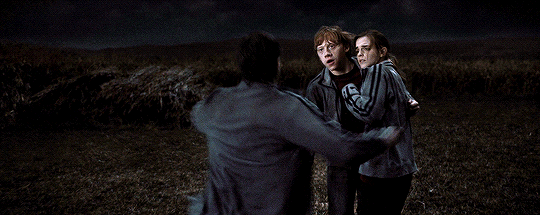
First things first, because of his abusive upbringing where he is constantly in conflict with his caregivers, conflict is seen as Bad Thing when we first meet him as a 11 year old. And it informs how he reacts to both Ron and Hermione at first. He instantly relates to Ron because Ron is an underdog - a boy who feels neglected and passed over in his large and boisterous family. Harry shares his own experience of neglect with Ron and they both bond instantly.
His initial impression of Hermione is that she has a "bossy sort of voice" . The bossiness is an important characterstic to his impression of her - she reminds him of an authority figure and he does not particularly take to her as easily as he does Ron. Before the troll incident, he is frequently annoyed by her interventions because "he can't believe anyone would be so interfering". It's her vulnerability and the fact that she may be in danger that makes Harry, and by extension Ron, go after her. And she pays it back in full with a demonstration of loyalty to them in front of people she wants to impress: teachers. This sets the tone of his friendship with Ron and Hermione.
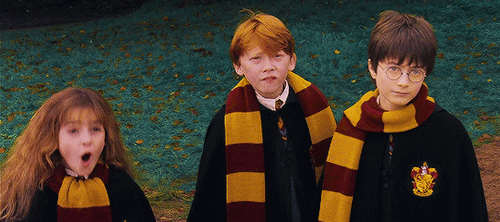
There is sense of easiness to his friendship with Ron, especially in earlier books that he doesn't quite share with Hermione. This is a bit gendered as well, of course. His relationship with Hermione evolves as Ron's own equation with two of them changes, more specifically Ron's cognisance of his romantic feelings for Hermione. So how does this inform his relationship with personal conflict?
Let's look at it Book wise.
Book 1-4: Since Harry tends to see All Conflict As Bad, when Hermione becomes his friend, he tends to ignore traits of her that he particularly doesn't take to. Specifically her argumentativeness - which he usually leaves Ron to deal with. For example, look at when Hermione drags him off to the kitchens in GOF. When he realises what this is about, he nudges Ron, and Ron does the protesting: "Hermione, you are trying to rope us into that spew stuff again!".
Often, you can say he is amused by Ron's more ..let's say colourful.. reactions to Hermione being overbearing. So when Ron and him are not speaking and Hermione gets a Quidditch term wrong, it causes him "a pang to imagine Ron's expression of he could have heard Hermione talking about Wonky Faints". It's that deeply ingrained into the dynamic.
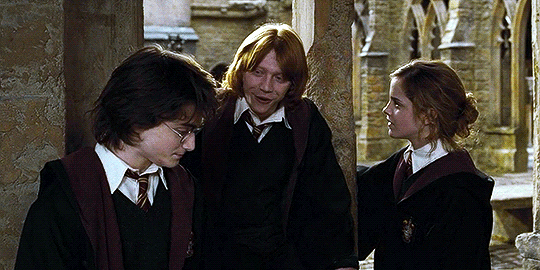
While Ron acts buffer and protects Harry from stepping into a potential conflict ("skip the lecture", "don't nag" he tells her), Harry's world view remains quite the same. Part of Harry's growing up is integrating conflicting points of view and gaining nuance. For example, he can't understand why someone like Snape, who seems to hate him so much, can also save his life at the end of Philosopher's Stone. This is his first venture into trying to integrate two conflicting things about a person into nuance. Dumbledore gives him a very easily digestible story, one that appeals to his ideal of his father and Harry is sated.
Again, Harry's world view is tested when he finds out that he relates with Tom Riddle - for their "strange likenesses". He doth protest too much at Dumbledore's office: "I don't think I am like him! I am Gryffindor!". And Dumbledore offers him a wisdom nugget: "It's our choices which define who we are" (paraphrasing). Harry is uncomfortable that he empathises with Tom Riddle, his parents' murderer, at this point in the story.
In the first four books, his only proper personal conflict has been with Ron.
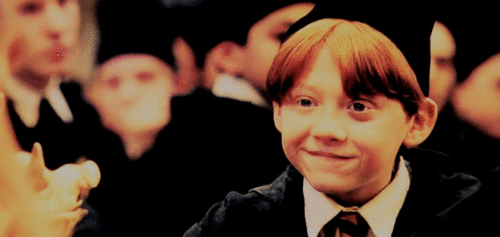
It is depressing to think about in these terms - but Ron is Harry's first experience of unconditional love (we can even put Hagrid here, but he is not the one who spends most time with Harry). And when Ron and him fight, Harry is so hurt by the prospect that he proceeds to abandon Ron before Ron abandons him. (the whole chucking a "Potter stinks" badge at him and making a jab about having a scar is what he wants, or the fight in DH where he yells "then leave! Pretend you have gotten over your spattergoit and have your mummy feed you up"). It's an interesting defense mechanism and he feels "corrosive hatred" towards Ron during these times because Ron and him aren't supposed to be like this. Ron is a certainty in his life. It's also why when Ron comes back, Harry either doesn't need him to apologise (as in GOF) or quickly forgives him in DH - although I do think Harry thinks the locket bit was punishment enough. But even without the whole locket, I think Harry has trouble holding Ron accountable in general beyond few slaps on the wrist - especially if Ron and he are on good terms.
5th Book: This is the transition point for Golden Trio friendship. Harry has come back from an immensely traumatising night at the graveyard and his PTSD isolates him from his best friends. This is also the point where Ron, especially after GOF, is aware of his romantic feelings for Hermione ("the perfume is unusual Ron", Hermione tells him in this book). So in this book, we often see Ron and Hermione on one side, with Harry on the other.
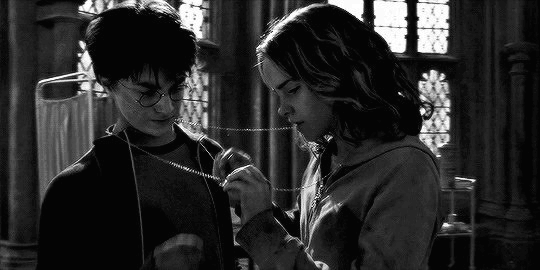
Ron is unwilling (quite like Harry in that respect) to engage him in a direct conflict, but he is also unwilling to shield him from Hermione's nagging in this book. This is why, OOTP is the book where you see Harry ignore or avoid Hermione and lie to her more than usual to avoid conflict. For example, he tells her that Snape thinks he can carry on Occlumency once he got the basics - that is categorically not what happened. Or the entire day he spends ignoring Hermione's warnings about breaking into Umbridge's office. (The description here is comical - about Hermione vehemently hissing so much that Seamus Finnigan is checking his cauldron for leaks. ) If he cannot lie to her or avoid her, at the end of the rope, he will treat her to display of his frightening temper.
Interestingly, OOTP is also the book that his world view goes through a tremendous upheaval: mainly, his ideal of his father and having empathy for Snape. It is unnerving for Harry to see Snape being the "boy who cried in the corner" when his father shouts at a cowering woman. Similarly unnerving is that his intense empathy for him - "he knew exactly what Snape felt when his father taunted him and judging by what he had seen, his father was every bit as arrogant as Snape always told him".
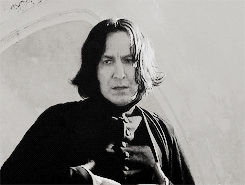
While he is placated that his father grew out of it, this memory of his father being a bully is something he cannot bear to watch again in DH. Few chapters later, he grins at Ron "sweeping his hair" back to make it look more windswept, just like his father - suggesting that Harry is beginning to integrate two conflicting things he knew about his father: from the people who loved him vs the people he was cruel to.
6th Book onwards: It's interesting to me that his better appreciation for Hermione comes after OOTP (one, because she is the one who challenged the whole Ministry plan and she followed him into a trap knowing it was one anyway) but also the timing of it is in line with Harry having a more nuanced understanding of his father. He struggled to hold conflicting information about him into one cohesive person - the boy who was a bully vs the man who joins Order of Phoenix to fight a war he could very well have sat out. The pedestal crashing helped Harry gain nuance (he thinks of his father and mother with pride in HBP - of them walking into an arena with head held high). HBP also sets up his deeper understanding with Snape in DH. There is lovely meta by about this by thedreamersmusing. Read it here. HBP is also the book he feels "sorry" for Voldemort and also feels "reluctant admiration" for him - both of things he is less defensive about.
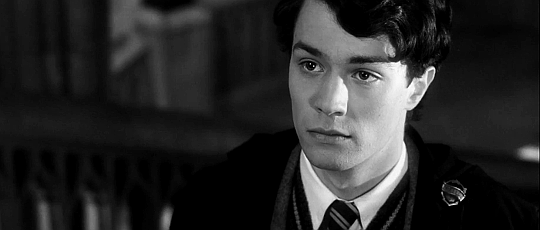
And this nuance informs his relationship with conflicts - especially the kind he has with Hermione. He is more confrontational with her and does not lie or sneak around her as much as he did in OOTP in the Half Blood Prince. ("Finished? Or do you want to see if it does back flips?" He asks her when she takes the book from him to check if it's jinxed. Or the "I hope you enjoy yourself" he calls out irritably when she declares intention to find out who HBP is. And "do you want to rub it in Hermione? How do you think I feel now?" He tells her when she says she was right about HBP).
The fact that he is willing to be confrontational with her is a big step in his character - a step up from his unregulated outbursts in OOTP, which is a function of him not knowing how to put his anger across in normal ways. He is also more willing to stand up for her in front of Ron too - "You could say sorry" he tells Ron bluntly. This is in contrast to his more quiet standing up for her in POA: "Can't you give her a break?" Harry asked him quietly. In POA, he lets the subject drop after Ron flatly refuses. Here, he presses on more : "What did you have to imitate her for?" "She laughed at moustache!" "So did I, it's the stupidest thing I have ever seen".
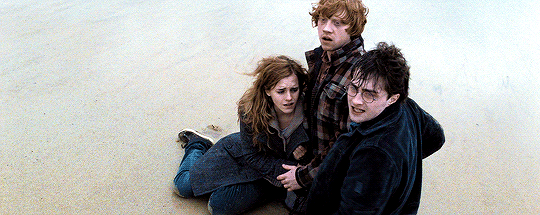
His relationship with Ron is an interesting contrast to his relationship with Hermione, which functionally teaches a very important lesson for an abused child who thought all conflicts are bad: That his friendship with her is challenging, and frustrating, filled with conflicts but their love for each other isn't disputed. It's a very important thing for brain development in general - to hold conflicting information in one space. The defense mechanism abused children do to avoid this is called splitting.
So, Ron allows Harry to be the age he is: a teenager and it's foundation for his further development, and Hermione teaches him how to be an adult, and therefore, spurs his growth. (In esoteric terms, if you look at Ron and Hermione as proxy parents - Ron is the Mother archetype, the one who offers unconditional love. Hermione is the Father archetype - one who demands best of him, and guides him).
Additional reading: Harry, Prongs and Prince - Harry's Inner Struggles For Forging An Identity. By u/metametatron4
Harry Identifies, and Reluctantly Admires Snape Even Before The Prince's Tale by thedreamersmusing
#harry james potter#hp meta#harry potter character analysis#hp character analysis#golden trio#golden trio analysis#harry x ron x hermione#harry and ron#harry and hermione#ron x Hermione#severus snape#james Potter#harry potter#tom riddle#albus percival wulfric brian dumbledore#albus dumbledore#metas#harry potter and order of phoenix#harry Potter and half blood Prince
626 notes
·
View notes
Text
A guide to the 02 kids’ personalities and overall demeanors
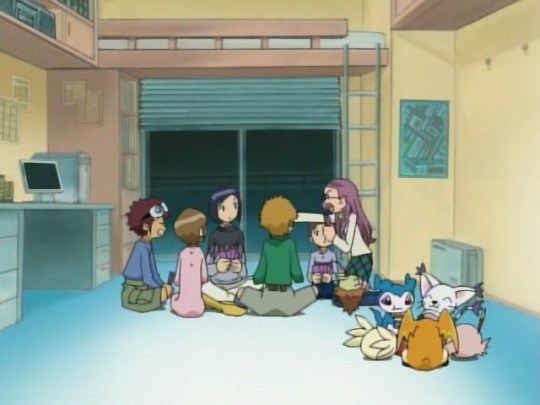
I’ve already covered the deeper details of each 02 kid’s character arc and development throughout the series, but I figured I might dedicate a more specific post about the complexities of their outer personalities, and their behavior patterns on a day-to-day basis. 02 is the kind of series that doesn’t really spell out what the characters tend to do or don’t tend to do, or what boundaries they will and won’t cross, which means it can be a bit of a challenging task to track their behavior over fifty episodes and figure out the patterns. Fortunately, these characters are written remarkably consistently over said episodes, so we have a lot to work with!
Disclaimer before we continue: In general, all of my 02-based meta is specifically written for the Japanese version in mind, but this especially applies to this one, because the majority of the nuances of the demeanor and personality traits described below were not retained in the American English dub at all (please see this post for more detail). As a result, please understand that if you’re working from the perspective of having only seen that dub, and the contents of the below post sound completely different, that would be why.
Daisuke and V-mon
Believe it or not, I would say that Daisuke is actually the most difficult to nail the nuances of out of this entire cast. This is probably a really weird thing to hear when the usual fandom mantra is that he’s “flat” or “lacking in development”, but I think the deceptive part is that while he’s simple-minded and himself doesn’t think in complex terms, analyzing his behavior as a whole and how he approaches things actually involves a lot of very delicate balances, and getting that exactly right can be very easy to mess up. Daisuke’s not a rude jerk who looks down on anyone, not in the slightest -- but he’s also not a saint who can do no wrong, either!
I think the easiest analogy (which I’ve brought up several times on this blog already) is that Daisuke is like a puppy, but not just any puppy -- a tiny puppy that barks very loudly at anything it perceives as threatening (regardless of whether it’s actually threatening), makes its feelings very clear with obvious likes and dislikes, and can do some phenomenally stupid things in a bid to please others, but in the end means no malice and only wants you to be happy.
This is to the point where I’m just going to have to bullet-point this, because there’s so much going on at once:
Excessively emotional: One of Daisuke’s earliest profiles refers to him as having “an excessively large range of human emotions”, and really, a lot of the humor surrounding him has to do with the fact he has incredibly dramatic, overblown reactions to nearly everything around him. So if he gets a little annoyed or suspicious of people making fun of him, he tends to get really dramatic about being upset, and when he experiences only a minor setback, he acts like it’s the end of the world, and when he’s emotionally hurt, he sometimes even gets set on the verge of crying (you can especially hear this in Kiuchi Reiko’s delivery). Even Daisuke himself doesn’t tend to get caught up in it for too long and gets over things surprisingly quickly, so you can take it as him just constantly being too wrapped up in the mood -- but when it really is a serious situation, he gets truly emotionally invested in it, too.
Too easy to read: Because Daisuke wears his heart on his sleeve and is dramatic about everything, he’s awful at hiding anything. Any attempt at trickery or trying to disguise his intentions quickly blows up in his face because he’s too simple-minded and too transparent.
Not malicious: Daisuke only ever lashes out or gets angry at others when he thinks others are doing something he disapproves of, or when he thinks he’s being attacked; he’s very warm and kind to everyone otherwise (even in the earliest parts of the series, when he’s at his roughest, you might notice he’s very soft around Chibimon, as if understanding that his partner is now in a very small and delicate form and needs to be treated accordingly). In other words, Daisuke is very quick to get defensive, but he has no malice or reason to be condescending towards anyone otherwise, and he’s perfectly friendly with people even when they’d provoked him earlier (because he doesn’t really hold grudges). He doesn’t attack people without reason; even when he voices dissent against what someone is doing, he very rarely, if ever, insults a person or their character directly. Even when he’s trying to state his opinions (such as when he bids for the others to accept Ken), he never forces them down others’ throats and accepts that they disagree with him, even if he’s clearly not happy with their disagreement.
Easily critical and suspicious: Daisuke is a very bluntly straightforward and honest person, and he seems to get most set off by people who act suspicious; note how his early-series outbursts towards Takeru tend to be when Takeru’s acting evasive, and in Hurricane Touchdown, he catches onto Wallace’s shady behavior even before he starts flirting with Miyako (Daisuke’s own method of trying to seem attractive to others involves just “doing something cool and hoping it’ll impress others”, so he seems to dislike the concept of flirting as a whole). Because of that, he catches easily onto “things looking off”, so he tends to call it out (even if sometimes he’s overdoing it and there isn’t actually anything significant to be upset about).
Supportive and adoring of others: Other than the moments when he gets set off, fundamentally speaking, Daisuke likes other people, is perfectly willing to acknowledge them or heap praise on them when they do something awesome, and generally cares for their well-being. He’s easily defers to others when he understands they’re better than him at something, and he even has a decently realistic scope of his limits (see how he’s perfectly aware he’s likely to lose the soccer game in 02 episode 8, and figures he might as well enjoy the experience). This is even taken to its logical conclusion in the Kizuna drama CD when he “credits” his friends for giving him amazing and insightful advice when all of it was actually pretty ordinary stuff they’d done offhandedly. It also means that, given his penchant for getting emotionally invested in everything, he has a huge emotional stake in making sure his friends are doing okay, and supports them accordingly.
Deferential to seniors/elders: Tying into the above, you may notice that Daisuke takes a properly respectful and soft tone towards his elders and seniors in nearly all occasions, even to the point of occasionally using proper polite-form language around them. All things considered, Daisuke is a pretty well-behaved kid.
Constantly getting strung around: As much as Daisuke looks like he’s aggressive, in actuality, it’s very easy to get him to back down if you argue against him strongly enough, and since he has such a “the heck is that?!” attitude all of the time, you can see him constantly getting strung around and at the mercy of things happening around him. That doesn’t mean he doesn’t have enough will to put his foot down when it becomes a really important subject (especially in the second half of the series), but it’s very often when he’ll be talked down by others around him and shrink with an “oh...okay...” In fact, this is why a lot of his actions aren’t nearly as reckless as they might be otherwise; as much as he’s a bit hot-headed and likes to lead the attack, he also has a sense of self-preservation and intimidation when things look a bit too dangerous, and will only push forward in such a case when there’s something he really believes in at the other side of it.
Lacking in self-awareness and insecure as a result: While Daisuke doesn’t have any signs of persistent self-hatred (on the contrary, there are times he arguably comes off as overconfident), it also seems that he has practically zero awareness of how he himself is doing -- which means that he ends up rolling over like an idiot trying to get others’ approval and trying to impress them, even when it’d be clear to anyone else that he already has that approval. This also likely ties into the fact that he’s perfectly capable of acknowledging others’ accomplishments and skills (see above), so you might even think that the problem isn’t so much that he thinks he’s bad as much as he keeps comparing himself to people he perceives as being that much more awesome. (Perhaps symbolic of this, he apparently has a complex over being shorter than Takeru and Ken, despite the fact that he seems to be of perfectly average height for a kid his age.) It seems that his only bar for how he’s doing is dependent on everyone’s reactions around him, hence why his ridiculous antics are significantly less pronounced when he has proper emotional support and friends to keep him in check. It’s also important to consider that this applies to his apparent crush on Hikari as well; his crush mainly manifests in wanting her approval very badly, and it’s mostly visible in terms of him losing a ton of brain cells in her presence and bending over backwards to please her or impress her. He never actually says in words that he’s interested in her, nor does he ever show signs of intending to seriously ask her out, so it’s something that’s only apparent because of this behavior, and it’s very likely he hasn’t even seriously thought through what would happen if she actually accepted him in return. You can basically see this as an extreme version of the way Daisuke tries to get approval from everyone else, and this trait of his noticeably dies down whenever there’s more important things at hand, or when he seems to be in the midst of getting proper validation from those around him.
Simple-minded and pragmatic: What’s usually referred to as Daisuke being an “idiot” comes from the fact he doesn’t play well with complex thinking, tends to settle for very simple explanations or answers, and more thoughtful types like Ken or Iori will often have to fill that part in for him. However, because Daisuke is so simple-minded, he’s sometimes the most pragmatic person in the group, because he doesn’t overthink things or get principles of theory caught up into everything. So if Ken is clearly not showing any indication of doing bad things anymore and is actively working to help, Daisuke believes he should be allowed to help regardless of what he’d done in the past, and if they’re dealing with the situation of potentially having to kill a living enemy, Daisuke points out that hesitation would have resulted in even more casualties. In essence, in a situation where everyone’s running mental loop-de-loops, Daisuke will usually be the first one to snap them all out of it and go “uh? Guys?” Moreover, this trait of his makes him very good at spotting glaring threads or asking questions about the elephant in the room, because since he works best with things that are right in front of him, he can’t not notice it.
Enjoys the little things: Because Daisuke is so simple-minded, it’s very easy to please him (this is why his chosen career path is something as simple as ramen making). Daisuke likes his friends, and appreciates even simple things around him, so he’s happy with even simple pieces of happiness -- hence, why he’s fine with potentially losing the soccer game in 02 episode 8, because he’s ready to simply just savor the experience of getting to play against a respectable and formidable opponent.
Note that the main reason Daisuke never seems to bring up any of these issues with himself within the series proper is simply that he doesn’t seem to be aware of them -- he’s too simple-minded to understand what’s going on with his own behavior in depth, and hence, this is how he can say he’s not worried about too much by the time of 02′s finale, especially since by that point he has a proper support group that’s already helping him deal with most of his issues anyway.
Daisuke also has the roughest speech pattern out of any of the 02 group (similar to Taichi and Yamato in Adventure); he has a tendency to shorten words a lot and use “rough” variants of words (for example “-nee” instead of “-nai”).
Mischievous, friendly, and playful, V-mon is pointed out even by official sources to be much like his partner (far more so than usual), and it’s likely a byproduct of the fact that Daisuke himself is very honest and straightforward about his emotions and thoughts, and so since he has nothing to hide, V-mon is pretty much exactly like him -- with the major difference being that he’s a little more outwardly friendly and less likely to lash out angrily. So he’s effectively Daisuke without that very thin abrasive exterior, and because both of them are so like-minded and friendly, they get along extremely well (albeit with quite a bit of comfortable bantering on the way there).
Ken and Wormmon
Ken is the more intellectual type that Daisuke isn’t, and even after his stint as the Kaiser, it’s clear that he’s still quite studious and naturally interested in studying things. Looking closely at his style of dress and way of carrying himself (note how he lays down his chopsticks in 02 episode 36) indicates he’s also a rather tidy person in general. Being someone who’s capable of thinking things thoroughly, this makes him able to have a lot of deep insight into both intellectual and emotional issues, but because he takes things too seriously sometimes, he can sometimes come off as a bit overly stickler or insistent (note Daisuke and Ken’s Shopping Carol, where he subjects Daisuke to a long-winded lecture about the history of Christmas, because, really, he’s a nerd), or lead himself down the wrong direction when he’s having a hard time being straightforward (such as when he comes up with some very flimsy theories about why Jogress might be dangerous in 02 episode 28).
In fact, Ken’s disposition could be considered to be the opposite of Daisuke’s in many ways; while Ken is much softer and more conciliatory on the surface, he’s actually much more assertive and strong-willed by default, and it’s made clear that, even after his reformation from the Kaiser persona, he could still be vicious if he wanted to, he just doesn’t enjoy it because he doesn’t like it and it goes against his belief system (note that he even offered to "dirty his own hands" in lieu of the other kids if push came to shove and Archnemon had to be killed in 02 episode 29, even though he clearly wasn't enthusiastic about the idea). In fact, he has a very strong sense of responsibility and believes heavily in making up for what he’s done -- recall that 02 episodes 26 and 49 involved snapping him out of it by reminding him that there were things that needed to be done, and that he himself still had many things he wanted to do that wouldn’t be addressed if he’d stayed fixated on his past. Thus, Ken doesn’t deny nor avoid anything he’d done, and he isn’t even all that prone to self-pity -- it’s just that his tendency to put too much responsibility on himself means that he also takes a while to accept everyone’s support, too, because he doesn’t like the idea of putting burdens on others.
Because Ken is actually one of the more straightforward people in this group and a fairly honest person (at least, as long as he’s not lying to himself), he might hold himself back a little bit in order to not be rude, but he doesn’t do it nearly to the same degree Takeru or Hikari would and is much more willing to speak his mind when he has an opinion he wants to voice or needs to sort out his thoughts on something. Conversely, he’s not nearly as cold as Iori can get when criticizing things (he’ll certainly be firm, but not as incisive). Most post-02 materials also indicate that he’s not above being a tease or even a little mischievous (see Armor Evolution to the Unknown, Diablomon Strikes Back, Daisuke and Ken’s Shopping Carol).
Ken uses a speech pattern that’s slightly more casual than Takeru’s, but not nearly as rough as Daisuke’s. While anime will often have speech patterns substantially change between different personas of a character, other than Park Romi’s delivery of a more condescending tone for the Kaiser and a significantly softer one for Ken, nothing about his speech pattern is substantially different between the two personas (not even the first-person pronoun), indicating that, in the end, they’re really the same person after all, just manifesting the same personality traits in different ways.
Wormmon is affectionate and clingy, unfailingly loyal to Ken, and his biggest advocate during a time when Ken is trying to relearn how to love and accept himself -- meaning that he ends up very important to providing Ken the initial support he needed before Ken allowed other friends into his life. Wormmon isn’t all nothing but clinginess, though -- he has some insight about the weight of his experiences when prompted (02 episode 46), and in fact is more than capable of calling out Ken’s behavior when he’s being unreasonable or throwing himself into denial (see 02 episodes 27, 30, and 49).
Miyako and Hawkmon
Miyako approaches everything she likes with an attitude that makes her come off as constantly having bubbles and hearts around her. When she likes something, she says so. When she doesn’t like something, she says so (and she will go off when she’s on a roll; see 02 episode 14). In fact, part of the reason she so infamously voices her opinion on people being cute is, quite simply, that it’s her honest opinion. (Note that she never actually tries to ask them out or anything -- she just wants to make it very clear that they’re attractive.)
For the most part, she adores the people around her, and, like the others in the 02 group, she’s perfectly respectful towards elders. She also loves poking her nose in others’ business and trying to be as helpful as possible, which is good in that she ends up being a huge help to others, but also not good in that sometimes she overdoes it a bit (when Hikari calls her out for being a “handful” in 02 episode 31, the word she uses is one that literally means "a little too overly involved in others' business").
Miyako is the one who gets everyone up in high spirits by being cheerful, and whose cheer rubs off on everyone else around her (see her cheerfully leading the charge into the Digital World with her “Digital Gate, open! Chosen Children, let’s roll!” catchphrase). This is something the rest of the group catches onto very quickly, asking her to supply the “usual cheer”, and the later episodes of the series especially drive home the fact that her presence and antics bring happiness to those around her.
Miyako has a similar “chaotic, sloppy, and straightforward” demeanor to Daisuke, but there are some key differences. Unlike Daisuke, who’s bluntly honest about his opinions mainly because he doesn’t really hide things in general, Miyako’s opinions will be out of her mouth before she can control it. In other words, she has a nasty case of foot-in-mouth syndrome. In addition, while Daisuke tends to have a very thin skin and lashes out defensively out of instinct, Miyako takes things much more at face value and doesn’t blow a fuse nearly as easily, but because she’s significantly more assertive and aggressive, she’s much more prone to doing what she wants on her own whims instead of backing down to anyone. In fact, Miyako is significantly more emotionally sensitive in the long run, so while Daisuke tends to blow a fuse more easily, he’s also able to shrug it off and move on more quickly, whereas Miyako has a thicker skin, but when she does take emotional pain, she takes it much more deeply and harshly. She also tends to get overwhelmed easily by stress and panic, which makes her one of the more prone to running around in circles and doing frantic things in the midst of it.
One thing you might notice about Miyako is that she’s actually more critical of herself than anyone else in the group is; most of the time they act with mild exasperation at her antics but don’t tend to criticize her directly, whereas Miyako is very aware of her own shortcomings and is constantly either criticizing herself or comparing herself negatively to others (see: 02 episodes 10, 14, 18, and 31 especially). If she slips up and does something that stepped on someone else’s toes, it doesn’t take her long to realize that she’s messed up and want to do better. So while she generally tends to act the most in-your-face and aggressive, she also doesn’t necessarily want to be this way, and suffers from self-confidence issues and a poor opinion of herself.
Miyako uses a feminine speech pattern that’s a bit more casual than Hikari’s (she noticeably is willing to use the word anta for “you”, which has a bit of a connotation of being abrupt and in-your-face, especially with Daisuke). She’s also the most likely to physically manhandle things, both in the affectionate (hugging people) and aggressive (grabbing things and jumping on them in order to attack) senses.
Hawkmon is repeatedly referred to as being like Miyako’s “knight”, since he has absolute loyalty to her (in spite of her ridiculous antics often meaning he gets strung around by her) and is effectively in charge of minding her so she doesn’t get too out of control. While his overly polite and gentlemanly demeanor initially seems like a sharp contrast to Miyako’s aggressive and messy personality, you might also notice that, at their cores, the two aren’t all that different -- both are unfailingly loyal to others, and both also have a penchant for dramatic theatrics and being a bit overly proud of themselves.
Iori and Armadimon
The key thing to know about Iori is that he’s not stoic because he’s not feeling fervent emotions, but rather because he’s constantly holding them back (this is especially apparent if you look carefully at his facial expressions and Urawa Megumi’s delivery, where you can tell his facade is often “slipping” even when his words would indicate otherwise). Since Iori is trying to live by the ideal of being a model citizen, especially under the very formal environment he was raised in, he comes off as mature for his age, but it’s very important to not forget that, underneath all that, he’s still an impressionable nine-year-old child with the wide range of emotions and immaturity of one, and when he does emotionally fall apart, everything tends to burst out (see 02 episodes 16, 44, 47, 50). In addition, Iori is never condescending about the fact he usually acts more mature than the others; the impression is that he’s much more strict with himself than he is with others, and in fact still does look up to his elders in the 02 group even when they’re obviously a lot messier than he is.
The “need to be a model citizen” is something looming over Iori’s head at almost every moment, and it’s the easiest way to understand the way he acts in a nutshell. Iori is focused on the idea of “becoming a proper adult”, which means that he’s adhering to all of these principles because he feels they’re necessary to live a proper and honest life as per the formal manners that his family background trained him into. But like a young child who insists “you have to do this because those are the rules!” all of the time, Iori is over-applying all of this, and even his own grandfather advises him that he really needs to chill (02 episodes 5, 24). In short, he struggles with thinking flexibly and understanding that life isn’t all that clear-cut, because he’s a young child. Since he also tends to bring out these things in relation to “what my father would do/say”, it’s implied that he’s basing all of this off of having only hearsay to work off of in regards to what his father was actually like, to the point of aspiring to an impossible, saintlike version of him he’d created in his head.
Note that Iori’s “rules” have less to do with institutional rules (that would be more of a Jou thing) and more to do with self-imposed personal rules; for instance, he doesn’t mind sneaking into school during a holiday when it’s obviously not hurting anyone (02 episode 6), but he struggles with things like wasting food (02 episode 3) or not formally introducing himself to an elder (02 episode 5). So in other words, his adherence to principles has heavily to do with “the right and proper way to live” more than anything, and what he believes is the right thing to do in a given situation.
Iori’s journey in 02 is largely fueled by the fact that, as an inheritor of sorts of the Crest of Knowledge, he has a sense of “I want to know and understand more” whenever he sees something that makes him curious, but unlike Koushirou’s desire to learn more about the world around him in terms of its technical workings, Iori mainly wants to know more about people. The reason he begins to let go of his inflexible mindset is that he has the humility to understand that he still has a lot more to learn and understand, and when he sees behavior from others that doesn’t make sense, he does his best to learn more about it -- hence how his aggressive probing into learning more about Takeru allows them to reach an understanding and eventual Jogress, and how he’s able to eventually reassess his own view of human morality and emotions.
Iori sticks out in that he almost always uses the formal variant of Japanese in most situations (nobody else in the 02 group does this). However, formal in this situation doesn’t necessarily mean polite; Iori doesn’t believe in flattery and will bluntly state his opinion in said formal tone, and will be very cold towards something he sufficiently disapproves of or doesn’t have any respect for, which can make him even come off as passive-aggressive at times. (Noticeably, while he still asserts his own opinion, he does refrain from criticizing the others in the 02 group too much, presumably because he respects and looks up to them a lot as his elders, regardless of how chaotic they can sometimes get.) In addition, because a lot of his demeanor comes from him restraining himself, when his emotions are sufficiently pushed over the edge, he loses grip on the polite form and starts “lapsing” back into the casual one.
Because Iori was so young during 02, and because the events of its story ended up really upending his view of the world, the huge eight-year gap between 02 and Kizuna makes it difficult to predict certain things about his demeanor at the time of Kizuna (especially since his own voice actor commented on the difficulty of conveying the nuances of Iori’s character, thanks to only being able to work with the limited time frame of a movie that doesn’t put him in the kinds of emotionally drastic situations that push him to his limit). That said, everything we’ve seen of him in the movie itself and the drama CD makes reasonable sense; now that he’s much older, he comes off as having much better restraint on his emotions and coming off as genuinely calm, but he’s still not one for flattery, and you can still see very minor slips in his facade every so often.
Armadimon also initially seems like a sharp contrast to Iori in terms of demeanor, in that he’s much more casual and laid-back, and he’s indeed a huge factor in reminding Iori to chill once in a while -- but, much like Iori, he prods and asks questions about anything he’s curious about. This initially seems to be out of simple-mindedness because, being a Digimon, he doesn’t understand human society that well, but his very basic questions often end up snapping Iori back to reality in realizing that he’s getting hung up on things that don’t actually make practical sense. Urawa also felt that Armadimon fills in some of the void that Iori’s late father left behind, in that he provides Iori with unconditional love and helps guide him.
Takeru and Patamon
Takeru is the kind of person who seems to dislike major disruptions to the status quo, so he doesn’t say anything inflammatory that’ll rock the boat. It’s very difficult to get him to talk about serious topics related to his deeper personal feelings (02 episode 17, 35, Spring 2003), and even when it’s clear he might have more misgivings on the situation, unless it’s an urgent situation where it needs to be brought up, he won’t voice his misgivings too clearly for the sake of not causing trouble (hence why Daisuke is so unsure what to make of him in the early episodes of the series, because Takeru constantly fails to clarify his own position in favor of a “good for you” or “sure, you keep believing that if you want” attitude). This also makes him the most likely to awkwardly change the subject or try to distract with small talk, and it means that, even when he’s saying cheerful, pleasant things, it’s very likely there’s pain or uncertainty under that initial facade. (Note that while his suspicions of Ken during 02 episodes 25 and 27 aren't nearly as vicious as Iori's turn out to be, we learn that he's still willing to quietly accuse Ken of working for his own self-satisfaction in the latter episode, but he never brings this up to anyone but himself.)
Because Takeru isn’t necessarily doing this to be consciously dishonest, it does mean that he also has positive applications of this tendency to take everything in stride and keep the peace, because he ends up keeping the more extreme personalities in the rest of the group in line and acts as an effective mediator. You could say that he has a pretty high amount of tolerance and a capacity for taking everyone’s points of view in mind. However, since it’s also very difficult to tell what he himself is thinking, his use of this as a poor coping mechanism for his personal trauma leads to a tendency for him to suddenly explode in a mess of emotions whenever something gets too personal, leading to sudden conflict, and with others at a loss in terms of how to deal with him (the most extreme example being 02 episode 19, but also present in 13, 11, and 34). This “two-sidedness” is why it ends up having to be the more consciously methodical Iori who steps up to try and understand him better as his Jogress partner.
Fortunately, Takeru shows signs of becoming more straightforward in the aftermath, although you can see that he still has a penchant for mild flattery and “trying to hold back for the sake of not being rude” all the way up to Kizuna (but, again, this can’t be said to necessarily be a bad thing when it means he has a valuable skill as a mediator).
Takeru has a fairly neutral speech pattern that comes off as casual but not too aggressive or assertive (not as absurdly polite as Iori’s, but slightly less assertive than Ken’s).
Patamon initially still seems to be “immature” in the same way he was in Adventure, which initially seems to widen the gap in personality between him and Takeru, but looking closer reveals that the differences aren’t as big as they seem; Patamon seems to have gained a capability for slyness and active trolling behind his playfulness (see 02 episode 7), not entirely like Takeru starting to use his evasiveness in a teasing-like manner. Moreover, Patamon does actually seem to have gained a bit of proper maturity in the meantime; see how he instructs the Baby Digimon on convenience store food in 02 episode 3, and in general seems much more willing to take independent action in ways he didn’t always in Adventure. Noticeably, Takeru’s difficulty with his own convoluted feelings means that he can’t even have a proper heart-to-heart with him about it on the situation (most glaring in 02 episode 34, where it’s implied that Takeru would rather leave Patamon to be happy right now instead of bothering him about it), especially because he’s clearly having difficulty even working it out with himself. However, despite their ostensible differences in mentality, Takeru and Patamon have no difficulty getting along at all in 02, and, other than Takeru pampering Patamon a bit, there isn’t all that strong of an impression of them being so mismatched -- perhaps because, in the end, they really aren’t all that different.
Hikari and Tailmon
Taichi stated in Adventure episode 48 that Hikari has a problem where she's so selfless and thinking of others that she'll never speak up about her own problems. Hikari states in 02 episode 31 that she compulsively cannot speak out about her own feelings even if she wanted to, to the point she’s jealous of Miyako for being able to be more open (even if it means being overkill at times). As a result: if Hikari’s talking about “the right thing to do”, or something for everyone’s sake, or something that’s relevant to other people and what’s best for them, she will be extremely vocal and quick to act, and she’s not above even chipping in with criticisms (see: 02 episodes 19, 32, 44). In fact, she’s fully capable of being playful or toying with others if she really wants to (see how she casually manipulates Daisuke into calling a lunch break for everyone in 02 episode 6).
The moment the issue at hand is about herself, though -- her own feelings or pain, or something that might hurt others’ feelings (hence the presumable reason she dodges Daisuke’s affections rather than proactively doing anything about it), or something that would put a burden on others for her own sake -- she completely clams up and refuses to do or say anything, and when bad things start happening to her, she resigns herself to her own fate and concludes she can’t do anything about it. Hence, why she takes such a defeatist attitude towards the Dark Ocean swallowing her up in 02 episodes 13 and 31, and why it’s such a big deal if she even so much as asks for help. 02 episode 31 indicates that Miyako reaching out to her is an important step in breaking her out of her shell, and the Kizuna drama CD -- which has Hikari assertively declare something she personally wants -- heavily implies further that Miyako was instrumental to this becoming possible.
Hikari is compassionate for others to the very end, expresses pity for BlackWarGreymon as early as 02 episode 31, and catches on quickly to Ken’s feelings on himself in 02 episode 37 (and even back when she’d been more skeptical about him in 02 episode 25, she never seemed to have real personal distaste against him as much as she still wanted to make sure he was trustworthy first). But although she’s one of the most compassionate in the group, she’s also one of the most assertive in the group. This leads to something that initially seems like a paradox: she’s actually more fervent about the need to fight than the more aggressive Miyako is. Miyako is, ultimately, emotionally caught up in everything and briefly falls apart at having killed LadyDevimon in 02 episode 44 (even despite knowing how horrible of a person she’d been), but Hikari is the one who points out that there would have been more victims if they hadn’t. 02 episodes 25 and 43 had made it abundantly clear that Hikari didn’t like it at all, but she states in 02 episode 37 repeatedly that they need to prevent there from being victims -- meaning that she values the importance of protecting all lives, including those who would be hurt in the process, and thus has some of the more resilient guts when it comes to the prospect of fighting to save others. Again, her hesitation only comes into play at its worst when it has to do with herself; working to save others is a no-brainer.
Hikari uses a casual feminine speech pattern that’s less in-your-face than Miyako’s, but she’s still a bit more casual than she was in Adventure, when she used the more polite watashi instead of atashi. Interestingly, Tailmon herself seems to have mirrored this as well, presumably because now that she’s had more time to recover from her miserable life under Vamdemon, she’s able to enjoy her life a bit more freely. This means that, while Tailmon is still the most mature and put-together of the Digimon partners in the 02 group, she sometimes acts a little more casual and playful in a similar way to Hikari, and while she has a certain degree of stuffy personal pride (see how she wasn’t very amused at how frivolously the other Digimon were playing around in 02 episode 3), she’s still open to enjoying herself a little more freely. Hikari, for her part, becomes surprisingly like-minded with her during those times -- see them in 02 episode 12 -- and, as stated earlier, it’s not like Hikari isn’t up for making tough decisions when they’re needed, either.
72 notes
·
View notes
Text
RWBY Recaps: Volume 8 “Ultimatum”
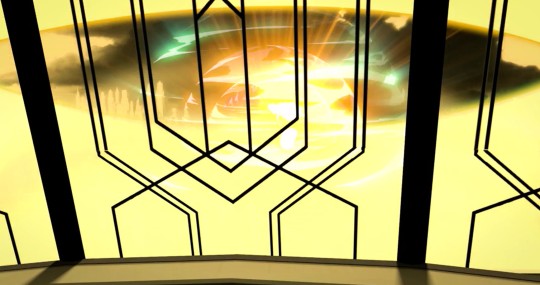
Welcome back, everyone! We had an unexpected break last week due to the horror going on in Texas. I'm glad we did. Not because of any salty "RWBY is bad right now yay free Saturday" feelings, but because keeping to a schedule for a fictional webseries should never take precedence over peoples' safety. I can't believe I need to type that sentence out, but it's true! Over the last seven days I've seen fans who are not merely disappointed by the mini hiatus (understandable) but outright hostile towards the crew because they... were ensuring everyone survived during an unprecedented emergency? Yeah. Given the highly critical nature of these recaps — including today's! — I want to be clear that my thoughts towards Rooster Teeth's creative choices are distinct from any thoughts about the crew itself, including the most basic forms of compassion like, “I sure hope everyone is okay over there.” In an age where it has become horrifically common to harass creators and even send them death threats over stories, it has likewise become necessary to remind people: Don't do that shit. Never do that shit. If I can teach anyone anything at all, let it be that!
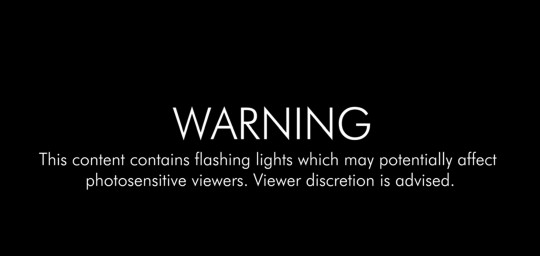
Anyway, dark fandom reminders out of the way, let's dive straight into our delayed episode. It was certainly a doozy. Titled "Ultimatum," we open on a trigger warning for flashing lights. Good on Rooster Teeth for including that, though I do wonder if creators shouldn't be including time stamps as well? Or perhaps a note that you can find those time stamps in the credits, avoiding any (minor) spoilers for everyone else? I'm not photosensitive myself, so I certainly don't mean to speak for that group, but my first thought was, "So how would I watch this episode if I was? Hand on the pause button, hoping I stop fast enough as soon as the lights start?" Hard to do given the surprise nature of the scene. Really, my answer would be, "Wait for the fandom to post warnings of their own, likely including where it happens so I know when to skip" which is perhaps an indication that this information that should be included from the get-go.
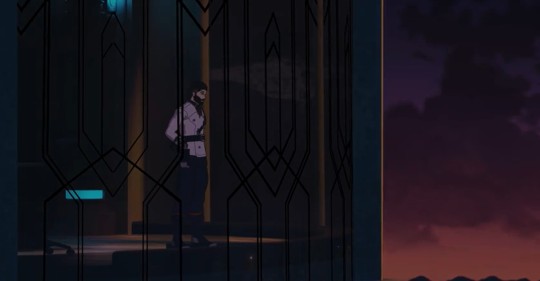
But I am glad the warning exists, regardless. The episode itself begins with a shot of Ironwood looking down at the kingdom. He's used his windows as a vantage point since Volume 7, so that's nothing new, but something about this particular shot reminded me of Ozpin, looking down from his tower. I'm sure the response from many would be simply, "Ah yes, the two power hungry dictators watching over their victims," but I think there's a much more nuanced reading here about leaders being expected to fix the literally unfixable and what that responsibility does to an individual. Of course, it's a nuance that is absolutely obliterated by the episode’s end, but the implication existed for a hot second!
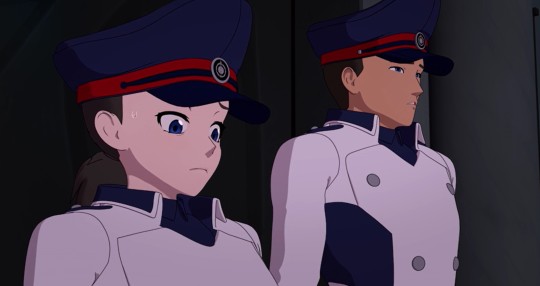
Two other soldiers are in the room with Ironwood, reporting that Cinder has helped Watts escape. They try to soften this with news that they still have Jacques in custody, but receive only a, "I don't give a damn about Jacques Schnee." Which, fair. He's pretty useless at this point. It's when Ironwood learns that both Qrow and Robin escaped too that he really gets mad, something his subordinates have been expecting given their scared expressions.
Now, I'm treading lightly here because I realize how this is going to sound given the end of our episode, but I still want to note that outside of that ending... this is a weird take? Just hear me out. Since Volume 7 the show has worked very hard to make Ironwood seem scary and unstable — bad setup for what we end with today — but the problem is that none of it works in context and it certainly doesn't work when compared to other characters' actions. They are literally in the midst of an unwinnable battle and thousands of his people are dying. If the audience wants a human being — who also just lost a limb and was betrayed by half his allies — o remain perfectly poised and polite during that, sorry, but that's not how human beings work. But even beyond this, what’s the message here? Ironwood raises his voice, so does Yang. Ironwood hits his desk, Qrow hits a child. If we're going to examine how Ironwood handles his stress and anger, he often handles it better than many of our heroes. Namely, by continually taking that anger out on inanimate objects. I kept waiting for him to attack his subordinates or attack Winter this episode, especially given where we end up, but it never came. Ironwood always has enough control to break the desk or punch the wall, not the person in front of him. Which, of course, would not be a good thing in the real world. I want to be clear given these sensitive subjects that if someone is breaking things in your presence that's a major problem to address. But this isn't the real world. This is a fantasy world in the middle of a war, populated by other characters who express their anger by punching people, slamming them into walls, or screaming at them until they run away. The story wants us to fear Ironwood long before he makes his objectively horrific choices and it tries to achieve that by showing us characters who are clearly terrified in his presence, by giving us a string of broken objects in his wake. But those details don't land well when we compare them to other instances of stress. In the same volume I have watched Ironwood take a deep breath to calm himself down when things have gone horribly wrong. I've also watched Weiss start a conversation by threatening her defenseless brother. So again, what’s the message here? It can’t be that acting violently towards someone = villainous behavior because, as established since Volume 6, that’s common for the heroes. Why are these subordinates terrified about Ironwood slamming his fist on a table, but Whitley has no problem hugging the woman who threatened him? Obviously there is a HUGE difference between our main group and Ironwood when it comes to other actions (cough-bomb threats-cough), but these day-to-day moments don't match up. The show wants to use violence as a way for us to easily identify the Bad Guy while ignoring all the times when our heroes do the same thing.
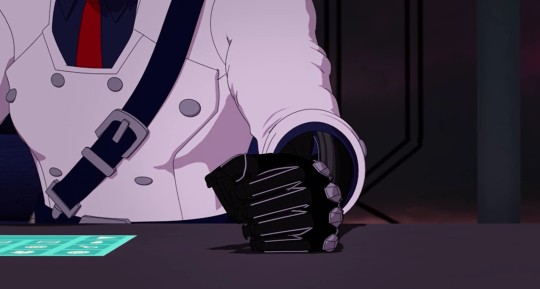
All of which isn't meant to be a defense of Ironwood. As we'll see in a bit, there is no defense for what he's done. Rather, it's a way of acknowledging just how badly he's been written. Why does a man who consistently reins in his anger and takes it out on objects suddenly shoot a councilman for literally no reason? Why does a man defined by wanting to save as many people as he can suddenly threaten to bomb his city? Ironwood's characterization is all over the place, in the sense that they keep writing him as the morally gray, sometimes harsh, but ultimately compassionate man he started out as... up until they need a villain. Salem isn't here yet, so Ironwood can shoot Oscar. Salem isn't attacking yet, so Ironwood can shoot the councilman. Salem is currently reforming, so Ironwood can threaten YJR and Mantle. He's the B-plot villain whenever Salem is out of commission, which is a problem for both their characterizations. This filler doesn't make sense for Ironwood and it severely undermines the threat of Salem. You finally introduce the Magical Big Bad and our heroes are facing more of a threat from a guy with a broken army and three loyal allies left? Hmmm.
The tl;dr is that Ironwood's arc is a disaster and, frankly, it's gotten old reading simplified takes of, "It's just a realistic look at what white U.S. men will do in power sweetie :) " RWBY does not have the context capable of conveying that sort of critical take because our world is not besieged by literal monsters and an immortal witch, to say nothing of how real life good guys do not get deus ex machina canes that fix the problem instantaneously. Ironwood is not an example of anti-U.S. imperialism, he's an example of writers who don't know how to write.
Anyway, I'm getting severely off topic. Obviously Ironwood is a major part of this episode, but the problems demonstrated here are two years in the making. This is the culmination of things I've been discussing for months across hundreds of posts... so I should probably stop trying to summarize it all in a few paragraphs lol. Perhaps when RWBY is over — or Ironwood has died — I'll do a single meta on his character, try to pull everything into one, unified argument.
For now though, we have an episode to analyze.
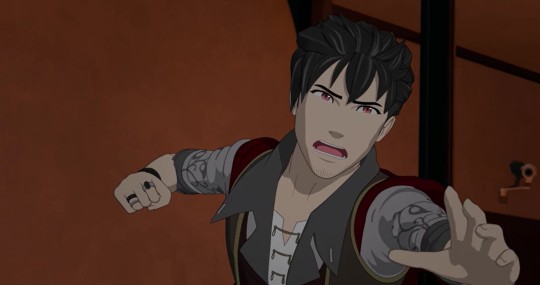
While Ironwood is receiving this news we get flashbacks to Qrow and Robyn. Qrow attacks a soldier in his bird form, which is hilarious. Someone GIF that please. It does raise some interesting questions about this magic though: does Qrow retain his aura and strength in this form (something I thought given his choice to transform during the explosion), or was that soldier just so shocked at being attacked by a crow that he went down easy? We'll never know, because that would require establishing concrete rules for this world. The point is Qrow is going feral in his freedom, throwing punches left and right — did he kill that guard? — while Robyn watches it all from under a rock. They're apparently still somewhere in the facility since all the exits are guarded, but that's not the good thing Ironwood seems to think it is. After all, Qrow is out to murder him. He wants to be there.
We all see where this is going, right? The show is going to ignore Qrow's crazy belief that Ironwood got Clover killed in favor of a "Qrow saved Mantle by murdering Ironwood"/“Qrow got revenge for Mantle by murdering Ironwood” ending. Who cares why Qrow wanted to kill him in the first place now that Ironwood has his finger on the trigger? If RWBY is good at anything, it's writing moments that encourage you to ignore everything that came before it. We'll be seeing more of that in just a bit.
"Damn it!" Ironwood yells, because the show is leaning into its cursing. He orders that the subordinates not return until "you have Qrow Branwen in custody." Here we have another great example of the show conflating what the audience knows with what other characters know. See, we know Qrow has a vendetta against Ironwood. We know their relationship is the important one to the story and that Robyn is incidental. Ironwood doesn't know that. There's no reason for him, as a character, to specify that they only bring Qrow back, but it makes sense for the audience who has the whole, thematic picture. Our understanding of the situation is influencing Ironwood's dialogue, which is... not great.
This entire scene we've had creepy music to hammer home just how evil Ironwood is. Except, as said, he takes a breath to calm down and the music fades. Instead of flying into a rage, hurting someone, or doing anything the music suggests he might, Ironwood calmly calls in for an update — which is when the explosion hits.
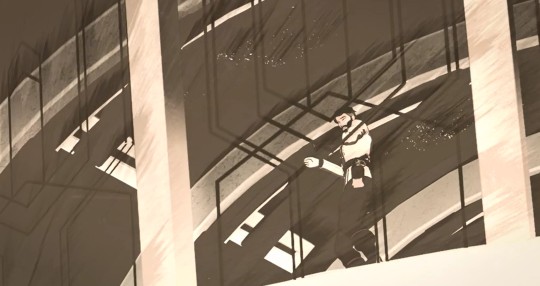
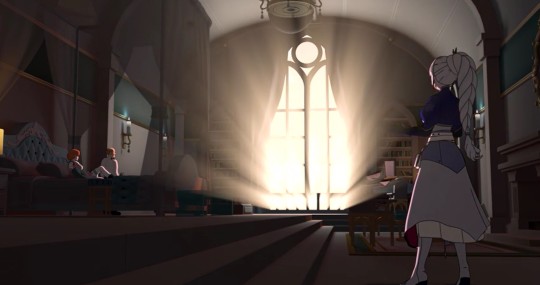
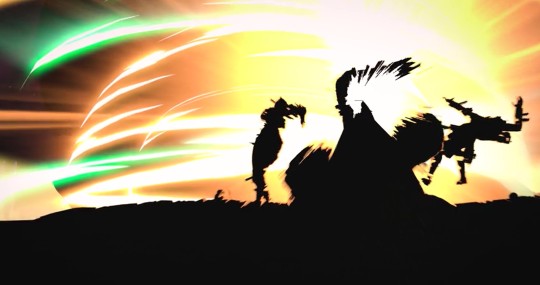
It's MASSIVE, seeming to originate from a lightning strike, which is weird, since it's coming from inside the whale, but whatever. The animation is very dramatic and pretty, as we've come to expect of RWBY, but the actual plot is lackluster at best. It's funny though because I thought for a hot second, when Winter and the Ace Ops were caught in the blast, that RWBY had actually done something exciting. I mean, holy shit! There are the deaths we expect from a battle like this. My god, what is everyone going to do when they realize that Oscar's needless attack took out five characters, including Weiss' sister —
No wait, never mind. They're fine.
Let's talk about that "needless" descriptor for a moment though. Do you all remember, two weeks ago, when I went, "Hey, why isn't anyone telling Oscar that that Ace Ops are approaching with a bomb? They're on a time limit! If someone would just mention that Very Important Information then Oscar wouldn't keep standing around to fight Salem." See, at the time I was frustrated because of how the plot was needlessly allowing Oscar to put himself in danger (especially when the whole point of this mission was to rescue him). Now, I'm frustrated because that same plot needlessly wasted the most powerful weapon the group had. There was no reason for Oscar to use literal lifetimes worth of stored energy when the heroes already had a bomb to do the same job! What was the point of that? I guess he took out the other grimm too, but without the whale that still would have been a challenge with a finite end, one Ironwood's army and the remaining huntsmen should have been able to handle. It doesn't feel justified to have Oscar use a weapon kept on the bench for lifetimes when there was another option literally minutes away.
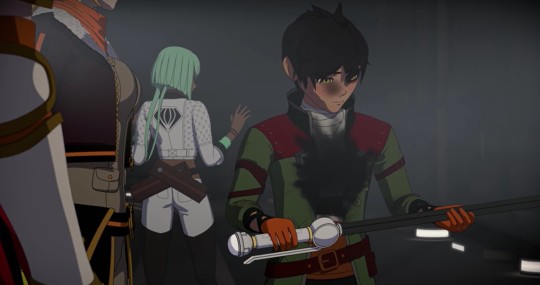
There's so much wrong with this I need another list. So:
Ozpin's cane supposedly stores kinetic energy, which may contradict what we've seen from it before. Regardless, we’ve never heard about this. The all powerful weapon comes out of nowhere
It also begs the question of why Ozpin wouldn't use that power at Beacon and why he wouldn't insist that they try to get their cane back while captured. You had an out this whole time! But we’re going to ignore that because Oscar is a little hesitant?
Which makes YJR's presence even more useless than it originally was, which was already pretty useless. Oscar essentially rescued himself
This kinetic energy miraculously doesn't hurt any people or buildings, just grimm
So what is the point of Silver Eyes? That's been their MO since they were first introduced. Sure, Silver Eyes can be used far more often than Ozpin's cane, but it still feels like a let down to learn that the Big Secret behind this weapon is... the exact same thing Ruby has been doing for years
Like Ruby, Oscar likewise didn't need any practice or training. He just set off this massive attack perfectly and without issue
We have now eliminated the biggest threat to the cast instantaneously — the whale and the other grimm — with no effort from the rest of the heroes. Like the Hound, the stakes are obliterated with no satisfying work on the part of our protagonists
Instead, as said, the actual plan already in place never happened. The bomb just... goes back. Kind of like how Cinder attacked and then just went back to Salem. Penny woke up and then just got knocked out again. We continue to go in circles
This is because no one took two seconds to tell Oscar, "There's a bomb on the way"
Because this threat is gone the show needs a new one, hence Ironwood randomly threatening Mantle with said bomb
The one way we might have justified Oscar blowing up the whale instead of Winter is if he did it to save Hazel, but Hazel is implied to be dead
Maybe he's alive, but if he's not that happened off screen and we're not sure how. It couldn't have been because of the blast itself — everyone else is fine — so what, Salem somehow killed him before she was blasted to bits? While he was holding her?
And there's no body?
Salem was torn apart multiple times during that fight and reformed instantaneously, yet now, conveniently, she's taking her time
None of the characters mention the issues above. None of them admit that there was no reason for Oscar to waste LIFETIMES worth of power when they already had a solution in the works. Fantastic
I need to take a moment to acknowledge that so far this recap feels... bad. Disjointed. Bit all over the place. Which makes a certain amount of sense because that's where my thoughts are at. There's so much going on in this episode — so much wrong with it — that I don't know how to boil it all down into a few, neat claims. This episode is a mess! We're barely a few minutes in and the combined issues of Ironwood's characterization and Oscar's choice have left me reeling. So if you're still reading this, bless your patience, I think we'll both need it for the rest of this journey.
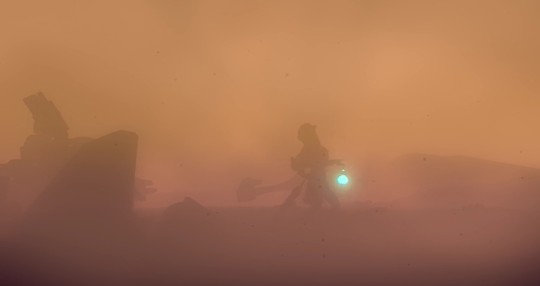
Let's snag a neater plot-point to discuss. Amidst all the chaos Neo literally skips away with the Lamp, clearly thrilled at how her own life is going. Later in the episode she'll text Cinder with the obvious: Salem is going to be pretty pissed when she realizes this is gone. “If you want her name you know what you owe me."
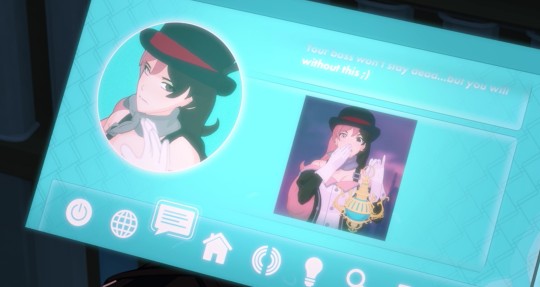
So wait... what is Neo leveraging here? Is she agreeing to give the Lamp back so Cinder doesn't get in trouble with Salem? Give Salem the password she's been looking for? Or give Cinder the password to use the Lamp for herself? What would Cinder even want the Lamp for when she's after the Maiden powers? I'm confused about what Cinder is being blackmailed with. Regardless, she needs the lamp for something and presumably what she "owes" Neo is Ruby. We get a cut to her just to hammer that home.
(Side note: both pictures of Neo are hilarious.)
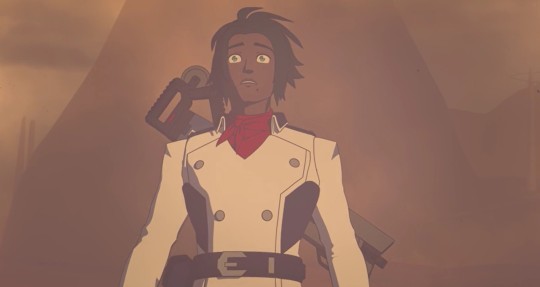
Before that though, back at the whale, everyone is taking stock of the situation when Marrow cries, "Hey, they were still in there!" I feel like this is another scene meant to make him look like the one good guy in the group — he cares about YJOR while the others can’t be bothered — but as always, that reading doesn't fit well with the situation as a whole. The others have barely had time to realize they're alive. I don't think it's a moral failing that they didn't instinctually worry about four betrayers, one of whom attacked them, while they're still checking that they have all their limbs intact. Besides, why does Marrow assume they're dead? The Ace Ops were caught in the blast as well, yet miraculously came out unharmed. They clearly didn't set their own bomb off, so it's logical to assume that YJOR did something themselves. It feels weird to have a "Marrow mourns them and Winter is the only other character who cares" moment when everyone is recovering from bomb shock and no one even knows if the others are dead. But, of course, the show is out to portray only two of these characters as good people, so ignore the logic and run with the emotion of the scene.
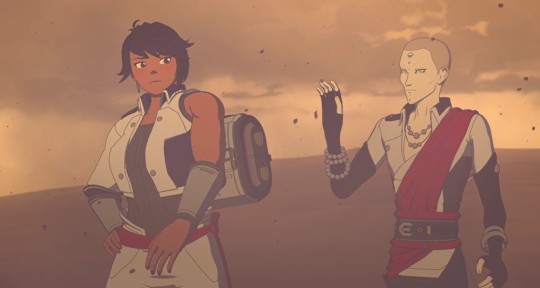
All of which is bolstered by Elm pulling away when Vine puts a hand on her shoulder. Why is she acting cold towards him now? Because they're not friends, remember?
While we get more ridiculous relationship dynamics, Ironwood calls in and congratulates them on the bomb working, but tells them to get back because they have another problem in the works. That would be Qrow and Robyn. Winter decides to tell him about the bomb in person.

We cut to Watts and Cinder watching the remnants of the blast from a rooftop. Cinder has tried calling, but no one answered. Unsurprising, given that Salem doesn't have any other allies left. Cinder says that the plan hasn't changed, she's still going to take the Winter Maiden's power for herself, and Watts can help her by bringing Penny here. He explains that he doesn't have full control over her. Rather, he implemented a virus that is setting her on a single path: open the vault, then self-destruct. Cinder, as one might expect, is furious.
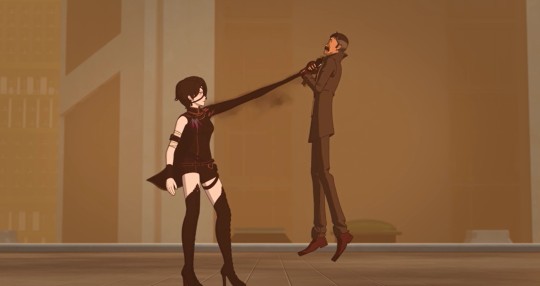
She snags Watts by her grimm arm and threatens to toss him over the side of the building. Thus begins the best part of the episode, hands down. Despite the danger he's in, Watts throws common sense out the window in favor of dragging Cinder in the most satisfying manner possible.
“You think you’re entitled to everything just because you suffered, but suffering isn’t enough. You can’t just be strong, you have to be smart. You can’t just be deserving, you have to be worthy! But all you have ever been is a bloody migraine!”
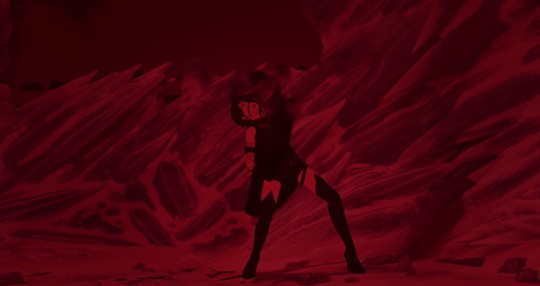
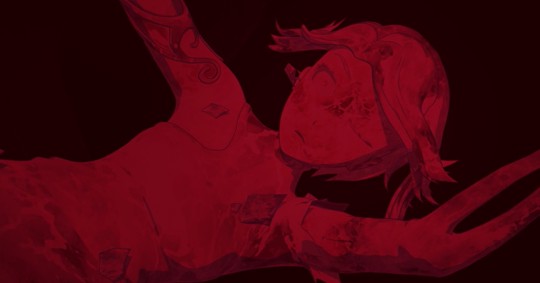
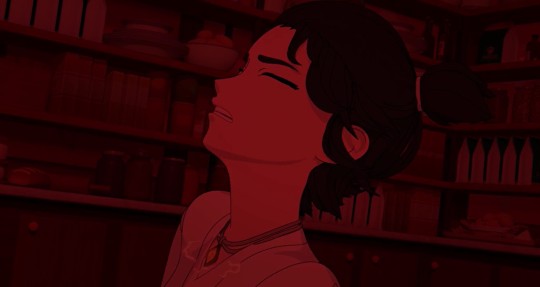
It's true! You know what else is true? This speech could apply to our heroes as well. Accusations of entitlement and reminders to be smart as opposed to just strong hit hard, considering those are the same flaws our protagonists are struggling with. The difference is that Cinder, miraculously, listens, pulling Watts back to safety and going to cry by herself. That moment is simultaneously more growth than Ruby has gotten and more sympathy than Ironwood has gotten. The woman who murdered Pyrrha is treated more kindly by the narrative than one of our initial heroes and our very first villain has taken more time to reconsider her choices than our title character. You know a show is falling apart when excellent choices are applied to the worst possible character.
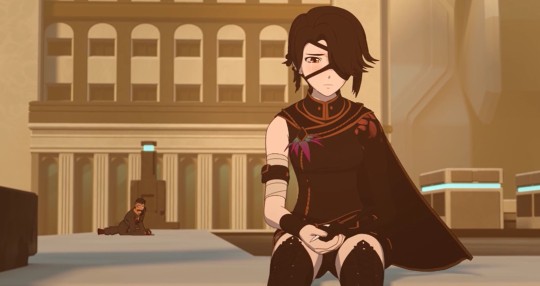
So Cinder is crying while Watts looks guilty and we cut back to YJOR's group post-blast. Yang is finally able to answer a call from Blake who is obviously overjoyed to see her. Weiss gives them directions to the mansion and they ask what in the world they'll do with Emerald, currently on her knees, mourning Hazel.
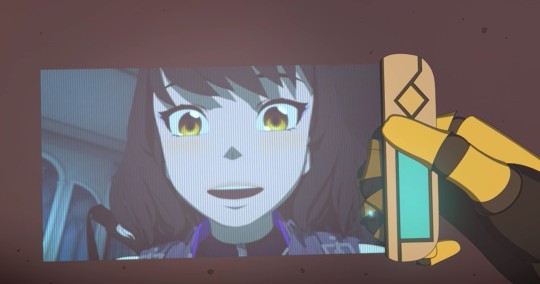
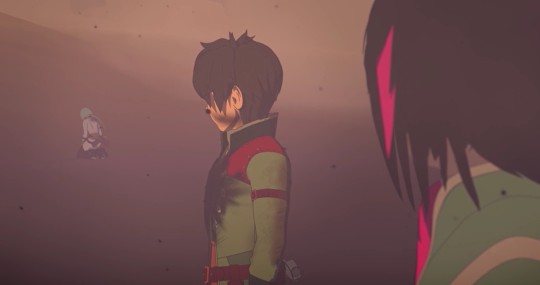
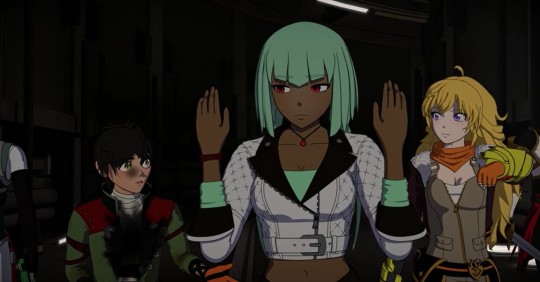
Thus begins the third most frustrating part of this episode. See, on the way back the group continues the conversation about what to do with Emerald, with Yang and Jaune distrusting her vs. Ren and Oscar encouraging cooperation. I can't believe I'm saying this after's Ren's speech and Oscar's entire existence... but I'm team Jaune and Yang here. Look, what Oscar and Ren say — the literal words coming out of their mouth — is nonsense. Ren goes, “We can’t let all of our actions stem from fear," as if Yang and Jaune are being ridiculous for mistrusting Emerald, one of the established villains, after years worth of harm from her. It’s weird that Yang points to her arm as something Emerald is responsible for, rather than being framed or the deaths at Beacon, but the general sentiment of, “She’s done horrible things!” is true. Ren’s perspective is the same simplification that was applied to Ironwood last volume, wherein everyone acted as if he was crazy for fearing an attack on his kingdom... post an attack on another kingdom and pre an attack on his kingdom. Putting generic lines in Ren's mouth about not being afraid makes him sound willfully ignorant, as if choosing to believe that someone is good will magically make them so, to say nothing of thinking it will erase all the harm they've already done.
Oscar at least acknowledges the difficulty here, but then follows this up with, “You don’t have to forgive her… just give her a second chance."

Oscar, honey, that amounts to the same thing in this situation. Allowing Emerald a second chance means working with her, which means trust, which means emotionally reaching a point where these characters can put aside the harm she's done them in an effort to give her that chance in the first place. This actually ties into a post I saw last night, one I've come across before, that claims redemption arcs don't require any suffering on the part of the person who has done wrong. I agree in theory, that prolonged suffering doesn't help anyone, but the problem is that people tend to conflate suffering with consequences and someone who has done this level of harm should face consequences for their actions. The problem with redemption arcs is not that the bad people suffer too much — emotionally and physically beating on them as a form of revenge — but that the people they've harmed are put into situations like this one. If Yang and Jaune let Emerald go like she suggests, they are agreeing that she doesn't have to face any consequences for the damage she's done (which, keep in mind, involves multiple deaths, not including all the lost lives here in Atlas). If they agree to give her a second chance, they are forced to jump straight to some level of forgiveness. We might claim they don't have to forgive Emerald to work with her, but from a practical perspective how are they meant to function, especially during a warzone? Anything she provides them with — information, watching their back in a fight, undertaking missions, etc. — requires trusting her enough to allow those things to happen: working with that info, letting her protect them, allowing her that responsibility. It's all about trust, trust she has yet to earn. In order for a redemption arc to be successful, the power has to be in the hands of the victims. They need to be able to see some justice for what was done to them, be offered some proof that the person in question has truly changed, and have the ability to walk away if they decide no, I don't forgive you, glad to hear you've improved, but please stay out of my life. Jaune and Yang have none of that. There are currently no systems in place for Emerald to face consequences for her choices, she has offered them no proof of her remorse or true motivations, and the other half of the group is pressuring them to give her that second chance without closure or reassurance. None of that makes for a good redemption arc and reducing that to, "So you want to see poor Emerald suffer, huh?" ignores the suffering she has already caused. The group are her victims and they are under no obligation to give her a second chance, particularly under these circumstances, which makes the story's choice to have Ren and Oscar act like Yang and Jaune are being stubborn or inconsiderate a problem. The conversation boils down to, "Give the woman you know to be a liar, manipulator, murder accomplice, and servant of our enemy a second chance based entirely on unfounded faith. If you don't you're letting yourself be ruled by fear."
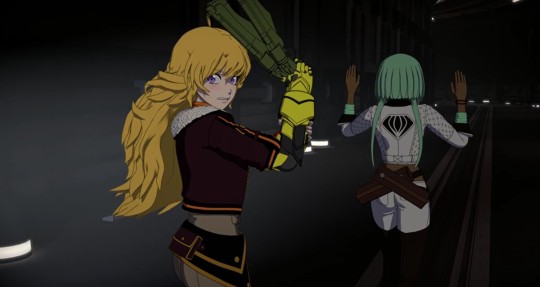
RWBY's touchy-feely themes really don't sit well within its realistic, morally gray premise. We cannot continually have these characters go through hell one moment and then have others accuse them of being paranoid the next. The fact that all of this is wrapped up in the group trusting Robyn, Emerald, and Hazel over their established allies remains beyond frustrating.
Because yeah, you know how Oscar finishes his speech? “I’ve already gotten a lot of help today from someone I don’t exactly trust right now." Meaning Ozpin.
The story is trying to compare Emerald and Hazel to Ozpin.
"Oh hey, I kept a secret from you after lifetimes of watching that secret lead to betrayal and death. I keep apologizing for my mistakes while ignoring that I had no reason to trust a bunch of kids with such world-shattering information and also that you tore it from me in the most traumatic way possible."
"Oh hey, I willingly joined our world's version of the devil and helped her destroy your school, leading to numerous deaths including your friend and headmaster. It was his death that put Oscar in this position in the first place! I then continued to attack your group, leading to another near death of a friend, and a kidnapping, and the destruction of Amity, until I became scared enough to make a run for it."
Which one of these characters is granted an instant second chance? You'll never guess who!
And I do think the word "instant" is important here because just like Jaune and Yang have the right to have distance and justice from Emerald, they had that right with Ozpin too. The difference is they got it. They had the power in the situation, as evidenced by their use of the Lamp and physically attacking him. Ozpin heard what they needed from him — leave us alone — and did that without complaint. They were given months to come to terms with the secrets he kept. They were offered apologies and acts of service to demonstrate intent: saving them in the airship and continually saving Oscar. I don't believe Ozpin ever needed a redemption arc, but even if we think he did, he had it. After three volumes of material Oscar's perspective is still "I don't exactly trust [him] right now" but Hazel and Emerald have earned at least the same amount of trust in a matter of hours? They're really having my boy look at the guy who has tried desperately to do right by him despite unimaginable circumstances, and the guy who tortured him to get information for Salem, and went, "That first guy. He's the one we need to watch out for."
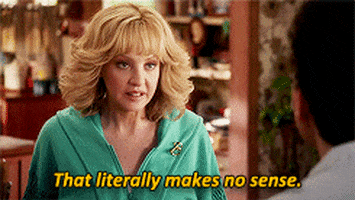
To make things even worse, Oscar tells the others that Ozpin took on all the torture so he wouldn't have to. So he did that and they still don't trust him? If you had told me back in Volume 6 that two years later the group would still be hostile towards Ozpin, while simultaneously urging one another to trust Emerald, I would have said you were lying. RWBY has its problems, but it's not that bad. Yet here we are. I suppose the one silver lining here is that Ren smiles when he realizes Ozpin is back? So at least one of them isn't prepared to draw their weapon at the mere mention of his name.
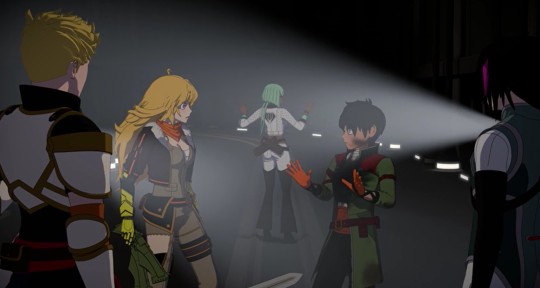
Both these moments raise more questions though. How in the world did Ozpin take on that torture when we clearly saw Oscar getting pummeled for a good portion of the kidnapping? Is that a weird merge thing the story hasn't bothered to explain? I wouldn't be surprised, considering Oscar said last episode he didn't want to use magic because it hastened the merge, he uses the biggest explosion of magic we've ever seen, and nothing has changed. Ozpin is still in the back of his head, thanking him for the tinniest shreds of decency they get. Ren, meanwhile, seems to be back to mindreading. How in the world does he know that Ozpin is back? I assume it has something to do with his semblance, but we don't know what. They could have shown us Oscar from Ren's perspective, perhaps with two distinct emotions swilling around to imply that he sees two different people now, not a useless shot of Emerald with purple flower petals, whatever purple means.
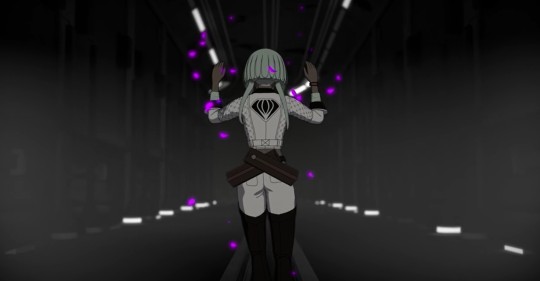
Oh, but no, we shouldn't have gotten either of these scenes. Remember that Ren's aura broke a very, very short time ago? Is it back already? Can he use this part of his semblance without it? Considering it was near impossible to see Ironwood's aura breaking in the Watts fight and we were then mistakenly told he used his semblance in the office, I'm going to go with, "The writers forgot."
Oscar explains that the cane had "lifetime after lifetime" of power in it and though there's still some left, "we have to be careful with how we use the rest." He says that Ozpin trusted his judgement and of course he did! Ozpin also didn’t know that there was a bomb on the way. Yet funnily enough, no one else mentions that, whoops, your choice made in ignorance was a waste and that's due entirely to us prioritizing hugs over basic mission information.
Also, all these explanations take place in front of Emerald. Half the group doesn't trust her, but they'll freely discuss their powers and limitations here. Remember how the group once wanted to talk about magical relics in front of the old lady they'd just met? Yeah, they've learned nothing.
Combine all this insanity with the fact that Ozpin's magic saved the day before Ironwood's bomb could do the same... while Ruby sat in a mansion drinking tea. Who's our hero again?

So things are a hot mess, to put it lightly. Their conversation finally ends when they hear voices and round the corner to find all the Atlas citizens huddled in the subway. For once the show actually writes them in a sympathetic manner, emphasizing how terrified and helpless they are. This image doesn't lead the group to any revelations though, certainly not anything that would tie back to Ren's earlier speech in the snow. No, once again the justified criticisms here are ignored as we hear that “However this fight ends, we could really use someone like you, [Emerald.]” That's it then. Discussion over. We knew as soon as it started that blindly trusting her was being presented as the "right" thing to do and now here we are, deciding that conclusively, despite Jaune and Yang's complaints. By the time the group reaches the mansion, Oscar is defending Emerald from Ruby. We're supposed to just accept that she's a part of the group now, only minimal pushback allowed.
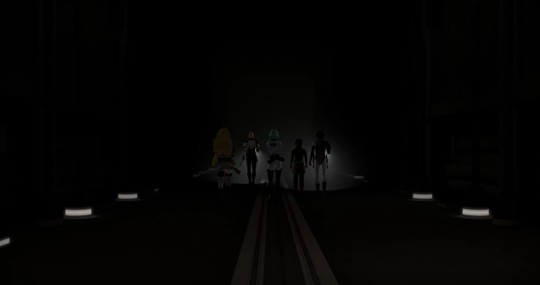
Before that though we return to Ironwood getting news that their bomb never went off. He briefly wonders who else could have done that, but puts the currently unanswerable question aside for what he does know. They still have the bomb and it could be "useful." See, this moment — like shooting Oscar and the councilman — is when Ironwood just randomly goes off the deep end. One minute he's talking about what they've lost and cradling his new arm,
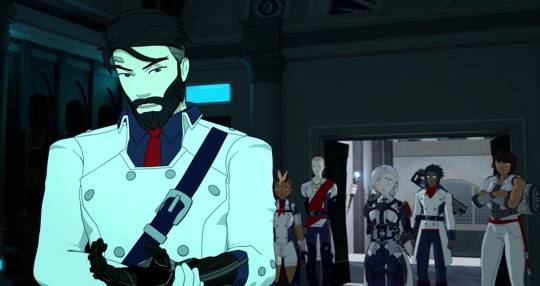
the next he's saying that he should have tortured Qrow to get Penny to obey him! Which doesn't even make sense since I'm pretty sure Penny hasn't ever spoken to Qrow. She wouldn't want anyone to suffer, true, but it's not like Ironwood had a close friend like Ruby to use as leverage. Qrow is just Some Guy to her. Regardless, he thinks Yang, Jaune, and Ren are decent replacements, despite Penny also having no relationships with them. This is what happens when your characters only start breaking up their teams eight years into the story, the response to Ironwood wanting to torture Ren to hurt Penny is, “Does Penny know Ren exists?” But, you know, torture is torture, right? Maybe. Probably not. I mean, if they're going to turn Ironwood into a cartoon villain, they could at least keep him smart.
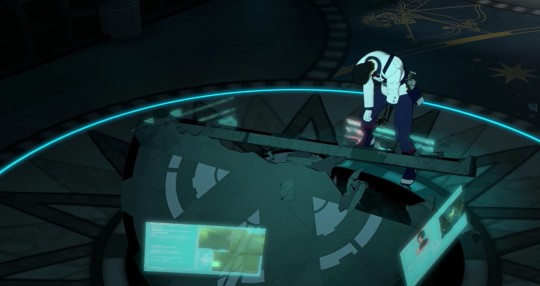
Because all of this is just the height of stupidity. Ironwood wants to torture people Penny barely knows to make her listen (so just grab some civilians? It would do the same job...). Ironwood wants to shoot down empty ships, even though no one, including us, knows where in the world those ships would have gone. Ironwood wants to destroy an entire city to try and save another city. He wants to use a bomb meant for a comparatively small whale and acts like that alone will take out the majority of a kingdom. None of it makes sense! And I know the easy comeback for that is, "Well yeah, Ironwood is crazy and evil" but he's not. I mean he is. Threatening torture and bombings is obviously evil, but he's never been insane, or stupid. As said before, his arc (or lack thereof) is an absolute disaster. The fandom assumes so many things about Ironwood given the opportunity — the whale is a suicide mission. He expects the Ace Ops to die on his order — and the writing hints at so many things that never happen — he's going to hurt his subordinates, attack Winter for disobeying him — and every time what we actually get is a far more compassionate, level-headed character... until he randomly does a 180 and goes, "Let's murder a whole city now!" I never wanted Ironwood to be the bad guy, but they could have at least given me a persuasive decent into this level of horror.
So... yeah. Ironwood has got to die by the end of the volume, yeah? Between Ruby warning the whole world about him and him going into full villain mode, there's no coming back from this.
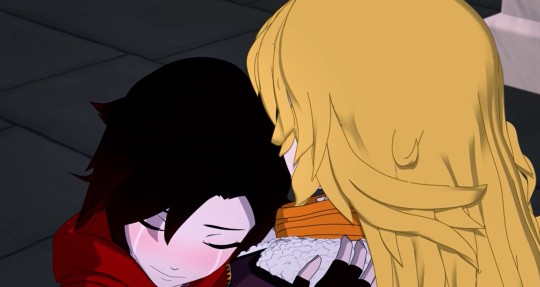
Neo sends her text to Cinder and the group makes it back to the mansion. Remember Yang's criticisms of Ruby's leadership? The ones she conveniently forgot about when Ren started to agree with her? Yeah, those are entirely gone as the sisters hug it out and, presumably, forgive one another for... daring to admit that things are bad? Look, I'm not going to deny that Ironwood's scene with Winter was creepy as fuck,
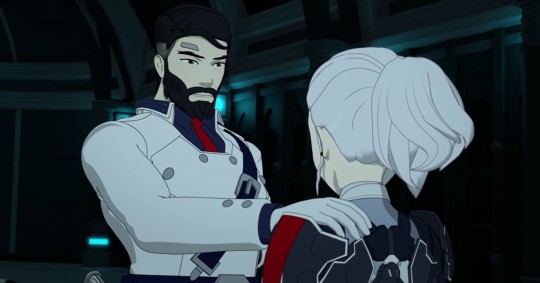
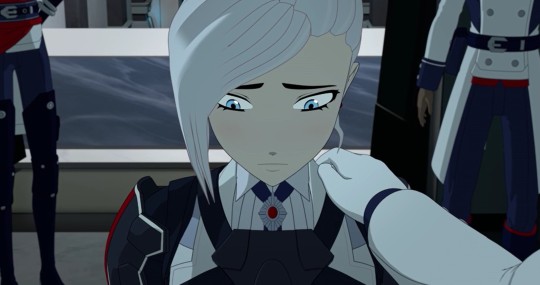
but I'm not of the opinion that the heroes are any better when it comes to the theme of obedience. They've attacked one another, screamed at one another, and any dissent from Ruby's leadership results in the questioner being left behind in the snow. We'll accept you again when you fall back in line. I used to adore the relationships in this show, but watching them now is just discomforting. The show might be 100% more obvious with Ironwood, using creepy music, a smile, and that hand on Winter's shoulder, but the concept of, "Sorry I dared to question you before! We won't ever do it again :)" isn't healthy either. The fact that the show keeps erasing theses problems with hugs — Weiss hugs Whitley now, Yang hugs Ruby, someone will probably hug Emerald soon — doesn't make the circumstances any less uncomfortable.
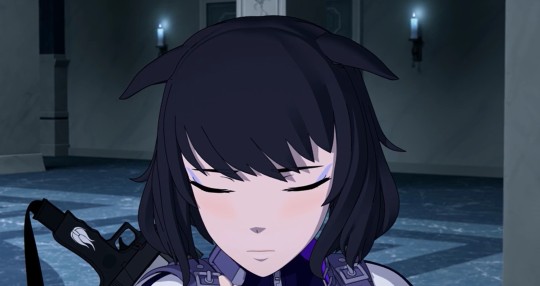
None of this even gets into the Blake and Yang hug. First of all, why is Blake acting like they had a fight and Yang might not want to see her? She's hiding inside rather than rushing to greet them, ears down in a devastated expression until Yang touches her. Combine this with Yang's "Do you think she's mad at me?" and it feels like the writers cut a fight in the final script and then didn't bother to remove the fallout from that. Seriously, where did any of this come from? You can't just have characters act like they've been fighting when they haven’t.
Also, can't forget this.
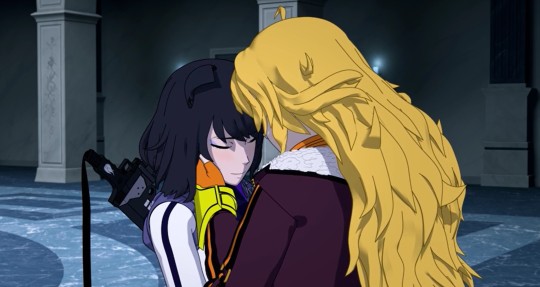
At this point there's nothing more I can say in regards to RWBY's almost-queer baiting. Is touching foreheads more intimate than the hugs Yang gave the others? Absolutely. Is that an appropriate stand-in for overt representation? Absolutely not. This would have been a perfect time for them to kiss. Take out Blake's nonsensical fear and replace it with them both reuniting after their first separation since Volume 5, working under the knowledge that either one could have been killed, finally admitting their feelings. Hell, they don't actually have to kiss. Not all girlfriends are interested in kissing! But they could use the terminology that makes things unequivocally canon. Another forehead touch when we got that in Volume 6? It's not enough, especially not when our straight couples have all been allowed their rep.
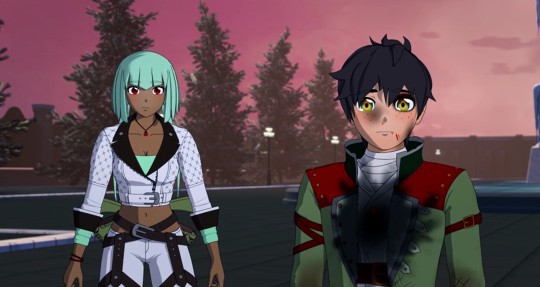
Ren at least wants to know where Nora is. He's presumably told what happened off screen as Oscar tells Ruby that Emerald is their friend now.
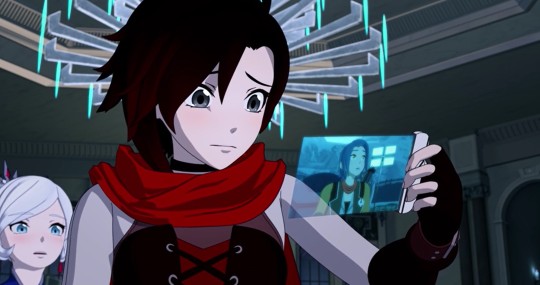
Then an emergency call from May interrupts the reunion and the group learns that Ironwood is bombing the Schnee ships. “Those ships… they were going to save people” Weiss whispers. How? Tell me how they were going to save anyone. Where were you going to take these people where they would be safer than where they are now? RWBY continually asserts things without explaining them, meaning there is precisely zero emotional weight here. Again, Ironwood is far past the point of defense, but I'd be a whole lot more critical of this particular action if I had a better sense of why it's bad. He appears to be endangering the people given May's shout to run — falling debris? — but the further implication is that Ironwood has doomed the people of Mantle by denying them these ships. It's that part that makes no sense based on what we've been told.
Which finally comes to the ultimatum of our episode title: Penny opens the vault, or Ironwood bombs Mantle. Great! So glad this plan is wicked smart and works well for his characterization. It's definitely not a nonsensical, unfounded, overblown change that feels like it belongs in a child's cartoon, complete with dramatic spotlight. Nope. Excellent writing choices all around.
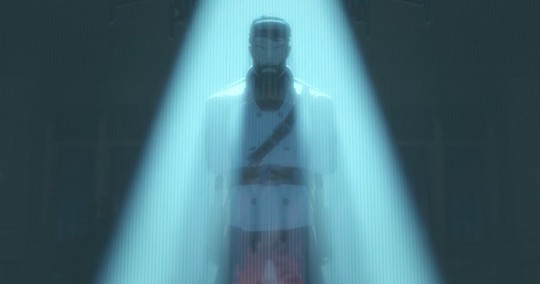
Our final line of the episode is, “I hope you live up to the title I gave you," referring to Penny's job as the Protector of Mantle, and you know what? That line could have been very cool if it was delivered by an Ironwood with a persuasive fall and a halfway decent plan in place. I love that we've twisted the concept of a protector and turned the title into a horrifying, rather than honorable responsibility... I just hate everything surrounding those details.
So, usual RWBY fare.
(At least we get to see that Nora is awake!)
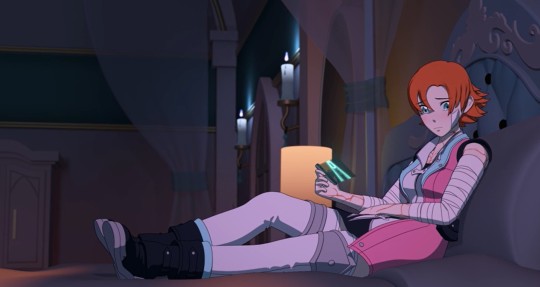
Will things get better over the next four episodes? I doubt it. We're still expecting the rest of the Ace Ops + Winter to ditch Ironwood, someone getting the vault open, the fall of Atlas, now the potential destruction of Mantle, and none of that includes Salem who should reform at any moment. Frankly, I'm not looking forward to any of it. The final leg of a season should make its audience excited to see how everything turns out, not dreading it. I've heard from multiple people that this is the volume that finally got them to drop the show and honestly? I'm not surprised.
As a final (happier?) note: we've finally got a bingo! I completely forgot our board last time, which was a terrible oversight, but we can update it now.
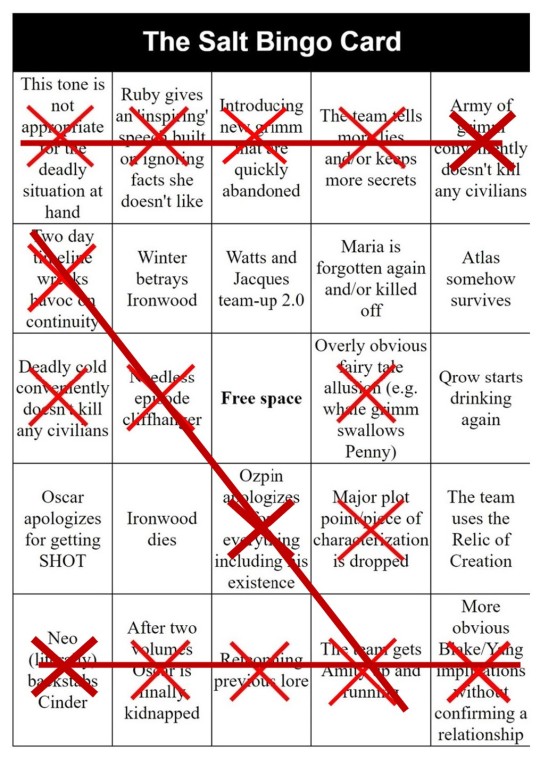
Our army of grimm can't kill anyone now that it got KOed by Oscar (that is the third one hit defeat of a major enemy we've seen this volume. Yes, I'm including the Hound considering it was obviously on its last legs after Ruby's eyes.)
I'm likewise including "Ozpin apologizes for everything including his existence" because he's done nothing but apologize since he came back. The emotion is there even if the literal words are not. Oscar reminded everyone of how untrustworthy he is, but kept the group from jumping them again. And Ozpin thanked him for it.
Neo didn't literally backstab Cinder (shame), but the Relic still counts.
So a triple bingo! Is that how bingo works? Idk, I've never played. I feel like I should have thought up some sort of humorous prize, but sadly I've got nothing. If you think of anything, let me know lol
That’s all then, folks. Until next week! 💜
103 notes
·
View notes
Note
hey can you , after taking time to gather your thoughts , do a meta kind of thing about klaine and their state of mental health in tested ( connecting them to bash ) . it is one of my favourite klaine episodes and love reading people's opinions on it . also , since you're really good at going deep into their mental health issues and have a much more grasp about it as a student of the subject, it'd be really interesting to hear your thoughts about it
absolutely! thank you so much for asking! i’m so sorry this took a minute - i’m in finals hell right now.
i’ve read a lot of meta about tested - some of it i agree with, and others i have issues with - and i think my overall takeaway is that glee was trying to do something really complex that had as many issues as it did because this kind of story is so hard to tell in a comedy show with an ensemble cast. darren and chris did a spectacular job - and they have, for all of klaine’s arcs as both individuals and a couple. i truly think we need to underscore how much of this story is the result of what they as actors bring to it - but it’s difficult to flesh out the nuances of trauma in a 45 minute episode with two other storylines.
under a cut bc i do not know how to shut up i’m so sorry for how much i rambled:
let’s start with blaine. his story was way more fleshed out, but i think what mainly struck me was how much blaine defines himself by his role to other people, and how it’s particularly strong when he’s struggling with himself. the way i see it, blaine’s struggled with depression the entire time we’ve known him, but it’s most apparent beginning in season 3 (i can talk more about this in another post if you want!), and i feel like one of the ways that manifests is him seeking this validation in others, in who he can be to them. his sense of self separate from other people does not seem very developed at all.
this has been consistent since season 2. at dalton, he was part of a team, part of the warblers, and we see in 2x09 how much he valued that structure. he was lead soloist, but he was part of a team, and everything he did was for the good of the team. at mckinley, he was kurt’s boyfriend. we didn’t see him connect much with the rest of glee club - he was fulfilled in being kurt’s boyfriend right up until it hit him that kurt was leaving, and when kurt did leave, when all of that stopped, he fell really hard. he’d lost that way of identifying and defining himself. he was still kurt’s boyfriend, but kurt was (unintentionally) pulling away, to the point where blaine felt like things were over, hence the cheating. s4 was really about blaine building up his sense of self and identity as blaine, and if you compare him in 4x05 to him in 5x10 - happiness looks so good on him.
we then move to new york. and we kinda see inklings off this in 5x06, but it’s a lot more clear once the ny arc starts, and bash kind of heightens everything. blaine is struggling, once again, with who he is. new york is a different world. he clings to kurt, because that’s familiar and that’s safe, and then kurt gets bashed. and afterward, kurt turns to exercise and healthy eating, building himself back up, and i think this was absolutely terrifying for blaine, for multiple reasons
kurt got hurt, and he wasn’t able to protect him
being reminded of kurt’s mortality - burt is very right, the guy could have had a gun. blaine is putting a lot of stock in the engagement/marriage as something that will tie them together forever, but the reality is, he can’t be sure of that. this could have been so much worse. he could’ve lost kurt.
blaine’s own trauma from being gaybashed. remember, his one biggest regret? he ran. kurt didn’t run. kurt is making himself stronger, more equipped to defend himself if there ever is a next time. he’s a hero for getting involved. blaine ran. (as an aside - this absolutely breaks my heart. the circumstances are SO different, and blaine was so much younger. this is not rational and not fair of blaine to be doing to himself. but that’s how trauma works, unfortunately)
one thing kurt and blaine differ on is this sense of self. kurt knows exactly who he is, and that knowledge and belief in himself was what helped him to survive the world beating him down for so long. he clung to it. it was a strength. blaine, on the other hand, values himself in how valuable he can be to others. so kurt getting stronger, eating healthier, arming himself for another attack, to blaine feels like kurt is saying ‘i don’t need you anymore’. and while that isn’t a bad thing, it’s terrifying for blaine, because if he can’t protect kurt and embody that role.....who is he?
and there are obviously the issues of body image, but again, i think they’re tied to this. blaine perceives himself to be physically weaker and kurt physically stronger, and he struggles with that. he struggles with who he used to be to kurt, and who he is now. i’m not going to dive deep into his actions throughout (let me know if you want that tho, i totally can!), because we’d truly be here forever, but i will say that blaine’s biggest issue is his need to be needed, because it illustrates that he values himself for what he can contribute to other people, not who he simply is. that’s the crux of it. there’s a lot of things with depression and the triggering of his own trauma wrapped up in there.
a last note: you can headcanon blaine’s parents however you want, bc there’s no text, but it is evident from 3x15, blaine growing up being criticized and judged by cooper, that he feels shame and guilt for the negative feelings he has and has learned to hide them (hurting himself even more in the process). this is another layer of depression - there’s a disconnect between who he wants to be, and who he actually is (with these dark thoughts and feelings, and that causes him pain).
now, let’s talk about kurt, because i feel like so many people just misjudge him entirely, in this episode.
kurt, from the beginning, has been known for his strength. bad things happen to him, and he grows stronger. that is what is happening here. he was forced to be vulnerable, he was broken (physically), and his reaction is to arm himself to prevent that from ever happening again.
he’s also big on control. trauma is unpredictable. it’s something that happens to you, that’s out of your control. the exercise and the healthy eating are his way of regaining that control. he can’t control what happened, and he can’t control whether it’ll happen again, but he can control his body and ability to fight back, be stronger, next time.
when i write about kurt’s mental health, i always go back to what he says to burt before the proposal. safe, connected, and loved. loved is a little less important here. i want to focus on safe and connected.
kurt was forced to live in his own world fairly young. the rug got pulled out from under him when he lost his mom, and then, getting so heavily bullied, he struggled to exist in a world that constantly reiterated that his existence was wrong. so, he detaches. he lives in the dreams of what he’ll be, an idealistic future that he creates to keep him safe because the real world won’t. problem is, you can’t live there forever. hyperindependence is also a symptom of trauma. people need people. you need to lean on the real world, you can’t make it by relying on a fantasy.
when kurt is drifting (which is mostly when he’s struggling mentally), blaine is the one who connects him back to earth. blaine brings him safety - think, again, about for how long this boy felt unsafe in the world. safety is huge for him. - but blaine is struggling with his own stuff, and he’s pulling away. so kurt is floating, and it doesn’t feel right, because he’s used to having that connection. the lack of intimacy is painful, for kurt. it can be funny to be like ‘omg he hasn’t had sex in a week wow what a horndog’, but kurt uses sex to connect. it’s the ultimate form of human connection, and with blaine, it is special. physical intimacy is very important to him, and when blaine takes that away, he gets scared.
kurt isn’t good with words. he’s not the best communicator. also worth mentioning: talking never helped in high school. telling karofsky he was ignorant and nothing could change who kurt was didn’t stop karofsky from assaulting him. for him, words don’t do anything, physical action does. it is not a healthy way to think, but it is the result of years of conditioning. the thing with trauma, is that you avoid anything that once was traumatic, regardless of the healthiness of your coping mechanisms. would it have been better for kurt to talk to blaine, when he found the porn? for sure. but that kind of vulnerability is incredibly difficult for him. it happens only on his terms, and this was not a time he felt comfortable for it.
for kurt, getting physically stronger seems like the most sensible solution, but he’s also trying to control everything to the point where he feels like it’ll protect him from the next attack. problem: that’s not possible. he can’t predict it. but for him, that’s what he knows, and that’s what he’s trying to do.
if he’s scared, he won’t show that. this is the solution he’s seen work in the past, so this is what he’s trying to do. for someone like kurt, who has lived through trauma after trauma, recovery is less important than protecting himself. equipping for the next battle. he’s at a point where the next battle feels inevitable, and he just has to be ready.
#kurt hummel#blaine anderson#glee meta#klaine meta#glee#pls send me another ask if u have questions!! i hope this answered things!#i feel like i want to add more to this but i talked for so long i'm so sorry#depression tw#trauma tw#assault tw#neha writes#klaine thoughts#kurt thoughts#blaine thoughts
54 notes
·
View notes
Text
About that last Cass meta, I wanted to correct or elaborate on something I realized in hindsight lends the wrong impression. This happens a lot with me, especially the longer a post gets, because I’m just trying to cram SO MUCH stuff in a post as is that I leave stuff by the wayside, and it typically tends to be the stuff I think is so matter-of-factly obvious to me personally, that in the moment it seems to be the most obvious thing TO leave out, as I instinctively think of it as the thing most people would figure out or connect the dots on themselves. Most of my posts I tend to write stream of consciousness as though I’m literally just speaking to anyone who follows me, and aren’t like, made with either the intention of gaining new followers or even REACHING people who don’t follow me, so like, just because I’m thinking ‘oh anyone who follows me would already know I think this’ like....that isn’t a valid assumption to make about anyone who just might read a particular post. And like, this isn’t reasonable on my part and does tend to lead to a lot of misunderstandings. So.....that’s a thing and its also a mea culpa.
In this particular case, the thing I need to elaborate on is my stance on how Cass is written speaking. When I spoke of the racist tropes I think are evident in a number of Cass’ depictions, even if unintentionally, this was NOT meant to reference or invalidate peoples’ conscious choice to make Cass have trouble with the spoken word due to various disabilities that might stem from the way her brain’s very wiring has been messed with in her backstory and appearances.
Writing Cass as disabled and having various speech impediments or trouble translating her thoughts into speech for neurological reasons is one hundred percent valid, and I should have used more nuance when describing my issue there. Personally, I tend to write her as being dyslexic and having aphasia, but she hasn’t had a specific speech or learning disability NAMED in canon as far as I’m aware, and there’s plenty that could feasibly apply.
But what I was talking about specifically is like......for instance, some people write Cass as struggling with ENGLISH, specifically, but fluent in not just sign....but say, Cantonese or another Chinese dialect as well. This is when red flags go up for me because I’m like, hmm, that’s an interesting choice that doesn’t seem to have anything to do with story logic, because see, Cassandra’s only issues with language are due to something that affects her equally with ALL languages. She only BEGAN learning languages not long after her first appearances, and the barrier that kept her from doing so previously like.....it went down in regards to ALL languages at the exact same time.
So while it definitely is reasonable to have Cass being more comfortable signing than speaking out loud due to the fact that she prioritized learning sign language first, is less familiar and thus potentially comfortable with being part of spoken and verbal conversations period, and perhaps depending on what specific speech or neurological disabilities you write her as having is physiologically more adept at translating her thoughts into sign language without any trouble than she is selecting verbal words......what DOESN’T make sense is Cass having somehow picked up Chinese over the past several in-universe years, but its English specifically she struggles with and has a barrier conversing with her siblings in it. THAT specifically is where I would say hey maybe if this is a choice you’ve made in your own writing, this is one where you should look at what made you make that choice and second guess it like mmmm what WAS I thinking there precisely, and was that thought something I want to stand by, upon reflection.
Similarly......there is a certain WAY that people go about writing Cass struggling with speech that raises red flags for me......and that’s when they write Cass speaking the broken English I referred to specifically in that post, as in, the way Hollywood depicts caricatures of Chinese characters speaking non-fluent English. There’s a very familiar and evident cadence to that, which I believe a lot of people simply default to when writing an Asian character who has speech issues, but again, this is something that you should probably subject to more self-scrutiny. Because a Cass who has speech issues due to a neurological disability is going to display those issues in a fairly consistent way no matter how long its been since she started learning whatever language it is she’s speaking, albeit with some variance that accounts for workarounds she might have developed or learned to compensate for any issues she has there. But what she’s not going to do, IMO, is perpetually speak English in a cadence that lends the impression that she’s just not familiar with the language or struggles learning it or just hasn’t become proficient with it regardless of however many years she’s supposedly been learning or using it at this point. I’ve heard a lot of people with various speech or neurological disorders speak, but personally? I’ve never heard someone speak with a speech or neurological disorder that manifests in them speaking like a racist caricature of a Chinese character according to Hollywood depictions. THAT, specifically, is my issue there.
(And related, my reference to Cass being as much a genius as anyone in her family in that last post was meant to specifically highlight how well and how quickly Cass DOES adapt to a society she was not at all raised to be a part of, once she’s given resources and support in order to enable her to do so. Cass picks things up with TREMENDOUS speed in the comics, and so part of my ire about that last trope in particular is how often I come across fics where by their DEPICTION of Cass’ speech issues, it seems a lot more like she just hasn’t become fluent in English yet. And although its of course true that she had a very late start, if she’s been a member of the family for years at this point in your fic and you’re not bringing up any specific speech or learning disability affecting her ability to learn English, and thus it basically looks like despite years of practice Cass simply hasn’t managed to attain enough of a command of this particular language to comfortably converse in it with her family.....that’s when I go scrunchy-eyebrowed. Because like I said, Cass is SMART and she picks things up damn fast, and without any other explanation provided in narrative for why she’s struggling here specifically, I AM going to draw my own conclusions about why you’re writing her speech the way you are, and you probably aren’t gonna like my conclusions but that’s really more of a you problem at that point, IMO).
And finally, I think but don’t quote me on that, I’m a mind changer, I change my mind a lot......the last issue I have where I see red flags go up when it comes to Cass and communication is when Cass is struggling with speaking English but without direct reference made to her doing so because of a specific speech or learning disability....and at the same time, the author of the fic shows no acknowledgment of any other character’s disability or any desire or intention to depict any of the other characters with some canon disability or another as actually disabled. I’m not gonna lie, although Babs is able-bodied in canon at the moment, if someone’s writing Babs that way while writing a Cass that seems plucked out of pre-Flashpoint continuity rather than based specifically in her Batman and Robin Eternal origin......I’m not gonna be all that inclined to give the author the benefit of the doubt there and assume their depiction of Cass’ speech issues is due to an actual desire to write her as disability rep. I mean, it could be that I’m wrong and they are! I don’t actually know! I’ve been wrong before, I’ll be wrong again, either way the world WILL go on! I’m just saying it like it is.....point blank, if there’s no sign of a single other disabled character in your work and Cass just so happens to visibly struggle with speaking English, I’m just not gonna automatically assume its because you’re writing her as disabled rather than just writing her while racist. And if you ever do end up called out for that and its only after the fact that you suddenly seem to backpedal and insist you were just writing her as disabled all along, my skepticism, it will still abound. *Shrugs* It just is what it is. Do with that what you will. Literally just like, my opinion dude.
But anyway! That is the nuance I should have included at that part in my already behemoth-esque post but didn’t, but that is very much a mea culpa and so please take this as a wholly necessary post script. Disabled Cass one hundred percent has my support and I should have been more conscious about implying otherwise, no matter the point I was trying to raise at the moment there.
23 notes
·
View notes
Text
Judge Not, etc.
The things I like to talk about are hard to talk about, so I spend a lot of time doing a bad job of talking about them. Add to that the fact that I'd often rather write than talk, and there's a double problem of having an archive of how often I've been wrong in my speculations.
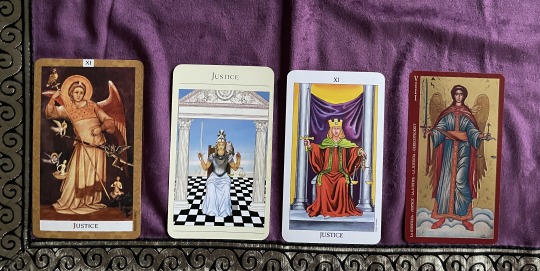
Anybody who has read more than 150 words published here knows that I have a less conventional worldview that does not translate well to orthodox theology, let alone small talk. Reducing it to "talking points" is particularly disastrous, because without nuance my several hypostheses, taken together, sound either psychotic or — at best, perhaps — like a spiritualization of boundary issues.*
The shortest, most accessible version of my worldview is that I have a tendency to side with Western Mysticism. This position, stated most succinctly, is that not only does All proceed from the One, but the One is in All, and All are embedded within the One. Diversity is an optical illusion that Unity enjoys in the field of time to entertain Oneself.
The source of my transcendental language and symbology is the Christian tradition. The person of Christ-Wisdom reveals the subject-object illusion as a phenomenon arising out of a fundamental lack of love — so to say, a judgement against What Is by insisting upon the unreal substitution of What Should Be.†
My prompt for this post was an experience a few moments ago wherein I “downloaded” a lot of information on the aphorism: Judge not lest ye be judged.
There is so much there, and, try as I might, it's too much to unpack verbally.‡
The statement itself is an obvious rune, requiring deep contemplation to perceive in its fullness. Contrariwise, it is as simple as taking the direction. Stop judging people if you don't want to be judged.
Practically speaking, this is just another "shape" of the Golden Rule, and anyone could take the template — Don't x (negative) if you don't want x (negative) — and apply it broadly with great success.
Anyone could. Will I?
In an act of meta-judgement, I accuse myself of elitism. In doing so, I have tightened what was already a loop, the subject-object illusion, into a noose! (This is easy to do when a person keeps twisting a thing on itself.) The knotty question of what is Me and what is (k)Not-Me is one that will take a lifetime to disentangle.§
I am in the midst of just such a disentanglement, and it feels like Hell.
In the esoteric tradition, the unspeakable Name of God has 10 spheres of concentration. One of them, called "Severity" (Gevurah), is something like Judgement in the way humans perceive. Opposite, the sphere called "Mercy" (Chesed) balances the Divine Being's equilibrium.
In public teachings, these correspond to the "places" commonly thought of as Heaven and Hell. Chesed is sky blue with mercy and the Presence, just as Gevurah is as red as a soldier's fresh-dipped spear and the fire that burns away impurities (Mal 3:2), endlessly dividing one thing from another.
By which I mean to say that the process of discernment (judgement) is painful, and it is precisely in my preferring that it not be so that I generate spontaneously a personal hellscape.
To wit, while it is my expressed desire to allow the flow of my experience rather than to try to control it, that is not my actual practice or perceived reality. This wish, too, is a judgement: an unreal substitution of what “should be” for what is, an unsustainable mental world, but one from which I may not yet emigrate. Such an insisting, while seemingly towards progress, is actually a reiteration of opting-against. Stasis. In so doing, I transform and recycle existing torment. More hell. More knot. Different look or feeling only.
The answer one receives ad nauseam from the sages is of no help at all, naturally. Over and over they say, Just because it's impossible doesn't mean that you can't do it.**
How may I conjure so to recapitulate my outward-projection of judgement in the direction of the internal, but only in the effort of negating both, not to visit upon myself the same judgement I export!
How then to tune the body's vitality to sense the interconnection between the immediately personal and the other, currently only accessible to me by metaphor? How, again, to transform through poetic device rather than by destructive realization? O muse, sing in me. Spin a new song, and when I have heard it, let me open my throat and shake the air!
________________________
Footnotes
*Which may be the case, or at least it may be the case that my "boundary issues" may have been the metaphor whereby I was able to access the material?
†The perceptive reader will understand that this is what is meant when we say that the Crucifixion was the means by which Christ (relationship, mediation) conquered Satan (self-importance, refusal). The Luciferian Urge is that which judges as insufficient. The refusal to judge from the cross equalizes this.
‡However, in the interest of trying to condense back into a different functional aphorism, it would not be wrong to say that "Judge not lest ye be judged" is another way of saying, "Do not resist reality lest ye never encounter it."
§ The final answer to this intellectual work ("All of it! There is no knot!") is (k)not a satisfying answer as the statement belies one's sensory experience of diversity; likewise the apparent answer ("None of it. I am a singular Me-object.") will not suffice for similar reasons. Experience yields innumerable interconnected me-objects whose subjectivities are hidden from us. Both of these responses are untenable, and much contemporary schizoid and self-destructive behavior results from their remaining unreconciled in the popular consciousness.
**This is the backwards teaching of the Phoenix, expressing the impossibility, and necessity, of self-transcendence.
2 notes
·
View notes
Note
You’ve probably discussed this a million times before, and it’s all a bit tedious, but I’m relatively new here in fandom, so forgive me.
I detest the Klaine cheating storyline in 4 SO MUCH. Ok people say it wasn’t OOC of Blaine, as he had all these abandonment issues, but there is no way you can convince me he’d have cheated. Four episodes before, he’s looking for reassurance that they’ll always be together, and he started having his panic of being left behind from mid season 3 onwards. - he was so devoted to Kurt. And then they get him cheating? I’d have believed it more if they’d grown apart, or lack of communication for a few more episodes, then an almighty fight and them splitting then for a while, but not cheating.
I see people say that Blaine and Klaine followers don’t call him out enough for his shitty behavior, this bring the prime example. I can see his faults, but never believe he’d have cheated on Kurt. This is one example of where I really do blame the shitty writing, the inconsistency of plot, and it just puts a whole big black spot on what is really an adorable love story. (Yes they should have issues, but not like this).
Hi Nonny! Welcome!
The interesting thing in watching new people get attached to the show is watching them go through a lot of the same feelings and emotions a lot of us went through at time of airing. And I totally get that! I HATED the cheating story line when it happened in real time. I was incredibly resentful that we had to go through that, and I feared that it was going to destroy Blaine as a character for me.
I have softened considerably over the years. Maybe I'm just old, maybe I've just analyzed the shit out of this show too long, maybe I've just gotten to the acceptance part of being fan, lol, I don't know.
Some things to consider, and things I've come to after years of hearing different people's view points on the matter. (Keeping in mind that I'm not attempting to change your heart or your mind, just how I've made my peace with it.)
1. Glee's connotations with cheating work on a different level than that of the real world. (I'm half convinced Ryan Murphy has inner trauma with cheating, which is why it's everywhere in his work.) Every character on this show cheats on everyone else in some capacity. Everyone. Some are more extreme than others, but it's a theme that plays through every character. (Kurt did it multiple times if you want to get technical - though he cheated on other love interests with Blaine, so people see it differently.)
And I think it's important to remember the lens in which Blaine's cheating is seen through. The focus point is on Blaine and this bad decision, while others get to skate by without it being a lingering plot point. So of course it's going to feel bigger. I'm not necessarily going to reprimand a character more than any other character just because their mistake is more glorified.
2. It isn't entirely out of character - at least according to a lot of Blaine stans who identify very deeply to him.
Now, personally, I still feel that it was cheap and easy writing - and the only way you were really going to break up Klaine is if it was a big thing like this. And Ryan Murphy is a sadistic little bitch.
But I do see Blaine as someone who self-sabotages. And I do see how the narrative can get from point A to point B. Yes, I do think more set up would have worked much better. But I can see that a Blaine who already feels his relationship is over would drown himself in another person in an attempt to make himself feel better. Humans don't always make sense in their decisions. Emotions are complicated things. And 17yos are kinda dumb. (My regards to 17yos - but you're still learning a lot about life at that age and your emotions and feelings are still very extreme.)
The other thing to keep in mind is that Glee likes to present big things and skip over the details. It does big sweeping moments like break ups and getting back together, but the finer nuances of smaller stories, and the links between those points, are often lost. (Which is why we have so much great fanfiction!)
And that said -- I would much rather we see a show about Kurt and Blaine suddenly stopping, and spending a great deal of time working their way back together than to see a long winded, downward spiral of their relationship.
3. I think one thing to remember is that after all this darkness, they end up together and happily married. Kurt wasn't completely innocent during the whole first break up. He neglected his relationship, thought you didn't have to work at it, and figured it'll be fine, etc, etc. That is definitely not an excuse for anyone to cheat on anyone else! But... they both learned something from the experience (same with the second break up). That relationships are hard work, and that it's something you have to work at maintaining in order for it to last.
The fairy tale romance of the second season is broken, and that's okay! Because they learn to love each other as actual people, not a romanticized idea of what a relationship should be.
**
I see people say that Blaine and Klaine followers don’t call him out enough for his shitty behavior, this bring the prime example
Nonny, this is not me putting you on the spot, I promise. But if there's one thing that I'm absolutely over, it's the fandom wars -- and how one group needs to be right by calling out all the shit on the other side, and then claiming things like the above statement.
The only time I see people refer to this is when anti-[insert thing] start shouting from the rafters about all the faults of the characters they don't like -- and instead of having a nuanced conversation within context, they just want scream about all the bad things that happened.
There have been fans of any character who do idolize them to the point where they do no wrong. And I don't think that's a healthy thing. But I think those of us who engage normally (subjective word I suppose) like the characters for their high points and their low points. Characters (like real humans) fuck up. If they didn't - they wouldn't be a good character.
I'll always call out shitty behavior (I most certainly did for Kurt in my meta). But I'm over the idea that someone with a biased attitude is going to make me feel guilt or shame over enjoying a thing because I don't hinge on every bad thing like I do the good things.
6 notes
·
View notes
Text
July 2021 Roundup
Discussed this month: The Once and Future King, The Good People, The Secret of Kells/Wolfwalkers/Song of the Sea (aka "Irish Folklore" Trilogy), The Matrix Trilogy, the John Wick Trilogy, Space Jam: A New Legacy
Reading
The Once and Future King (T.H. White) - I've actually read this before, but it was a long time ago and I remembered very little of it so it seemed time for a revisit. Written between 1936 and 1942, this is a surprisingly meta retelling of Arthur and Camelot, very obviously and heavily influenced by WWII, with much academic pondering on the concept of humanity and war and ongoing conflict against Might=Right - looking to the past to try and understand the present. Some familiarity with the legends is assumed, White occasionally making reference to Malory, and there is a strange anachronistic feel - Merlin lives time backwards and talks of Hitler and other 20th Century references, White frequently refers to Old England and the way things were "back then", but also calls Arthur's country Gramarye, the narrative taking place an a kind of alternate history/mythology where Uther was the Norman conqueror of 1066, and yet reference is also made to the Plantagenet kings.
Comprising five volumes (the first four published separately at the time, and the final posthumously), it struck me on this read how each of the first four are structured around the childhood of a major player -Arthur (The Sword in the Stone), Gawain and his brothers (The Witch in the Wood), Lancelot (The Ill-Made Knight), and Mordred (The Candle in the Wind), and how their upbringing played a part in the inevitable tragedy of Camelot. In the final volume, The Book of Merlyn, it comes full circle as Arthur on the eve of his death is taken to revisit the animals of his childhood for much philosophising (at one point Merlyn argues at length with a badger about Karl Marx and communism.)
The Sword in the Stone is the most engaging, with young Arthur (known as "the Wart") and his tutelage under Merlin, being turned into various animals like an ant, a goose, and a hawk to learn about each of their societies (political allegories), and meeting with Robin Wood (Hood) and Maid Marian to battle Morgan le Fay, and the climactic pulling of the sword from the stone. This was of course the source material for the Disney film, although missing the wizards duel with Madam Mim (appearing in the original publication, but removed for the revised version).
The Ill-Made Knight is the longest volume and was honestly a slog to get through, because honestly Lancelot is pretty dull/terrible, and the Lancelot/Guenever love affair less than compelling. Ultimately it's Lancelot's hubris that dooms them - he is warned that Mordred intends to catch him out in Guenever's room, but he goes anyway, and doesn't leave when he tells her to, because he is stupid.
It’s no surprise that the female characters are given the short shrift, but there’s an uncomfortable vein of misogyny running through the book. To wit:
Elaine had done the ungraceful thing as usual. Guenever, in similar circumstances, would have been sure to grow pale and interesting - but Elaine had only grown plump.
And then later:
Guenever had overdressed for the occasion. She had put on makeup which she did not need, and put it on badly. She was forty-two.
Morgause (the eponymous witch in the wood/queen of air and darkness) is a negligent mother whose sole motivation is revenge, Elaine rapes Lancelot by deception, Guenever is hypocritical and shrill (but achieves a sliver of nuance in Candle), Nimueh is a nonentity, and Morgan le Fey is a monstrous fairy. If only White had turned his academic pondering inward and in order to examine the role of women in his worldview other than as damsels or instigators.
But Arthur also gets the short shrift - after all the focus in his childhood, he becomes almost a peripheral figure in the rest of the story until the very end, and we're not actually given much to show why he is the once and future king, other than that he tries to institute a slightly less brutal system.
Ultimately, White is more interested in philosophy than character, and so Camelot's inevitable tragedy feels more clinical than visceral.
The Good People (Hannah Kent) - If the Irish Folklore Trilogy (discussed below) is the beauty and wonder of Irish myths and legends interacting with the human world, this book is the cold danger of superstition and the devastating affect of folklore used as an explanation for life's ills. Set in 1820's rural Ireland, Nora is widowed and left with the care of her young disabled grandson Michael, believed to be a changeling. The local wise woman Nance, who feels the touch of "the good people" sets about to drive out the fairy from the child, believing that the "real" Michael will return, much to the growing dread of Mary, the teenage girl Nora has hired to care for him.
Here fairies are seen as a malevolent force, "sweeping" away women and children, causing bad harvests, and bringing death to the village - to be respected and feared. And then there's Nance, bartering traditional cures for ailments and troubles - some work, some do not, and some pose great danger. On the other hand, this is a remote village where a doctor must be fetched from Killarney, and only one priest who is less than charitable. Neither provide any help or support to Nora.
SPOILERS It's an upsetting read dealing with dark subject matter - grief trauma, child abuse and accidental infanticide, a kind of slow burn horror. If it takes a village to to raise a child, it also takes one to kill a child, as mounting fear and superstition moves through the population like a contagion, heightening Nora's desperation for the "return" of her grandson, and Nance's to prove her knowledge. It's an impeccably researched novel (based in part on a true event) but very unsettling - poor Michael is never really given humanity, and I feel this book would be hugely triggering in its depiction of disability and neurodivergence.
Watching
The Secret of Kells/Song of the Sea/Wolfwalkers (dir. Tom Moore) - I've been meaning to watch these films for absolutely ages, and I finally got to them this month. I’m pleased to say that the many people who recommended them to me were absolutely correct, because they appear to have been made to specifically cater to my interests. Some mild spoilers ahead.
I watched these in internal chronological order as suggested by @ravenya003, starting with The Secret of Kells, set in 9th Century Ireland where the young monk Brendan helps illuminate the to-be famous manuscript and befriends a forest sprite Aisling, under the threat of a Viking raid. Next was Wolfwalkers, jumping forward to 1650 Kilkenny where the English girl Robyn, daughter of a hunter, is drawn into the world of the forest and Mebh, who turns into a wolf when she sleeps. And finally we go all the way to 1980's in Song of the Sea for the story of Ben, who must help his younger sister Saoirse (a selkie) find her voice and bring back the faeries who have been turned to stone by the owl witch Macha.
Although the stories are completely separate, they've been described as Moore's "Irish Folklore" trilogy, and it’s easy to read a through line from Kells to Wolfwalkers in particular - both deal with fae of the forest, and Aisling appears as a white wolf at the end of the film (having lost her ability to appear in human form). I like to think that Aisling is in some way the progenitor of the wolfwalkers - after all, Kells and Kilkenny are less than 200 kms apart.
Song of the Sea is distant from the other two in both time and subject matter, dealing with selkies, creatures of the water. In many ways, Kells and Wolfwalkers feels like a duology, with Song more its own thing. On the other hand, an argument could be made for common fae spirit/s in different forms across all three films - Aisling is a white sprite, Robyn takes the form of a white/grey wolf, and Saoirse a white seal.
The strength of these films other than the folklore is the visual style - I really love 2D animation, and while I appreciate the beauty of cg animation, I often find in the latter’s focus on hyper-realism the artistry can be left by the wayside. These films not just aesthetically beautiful, but the art is used to tell the story - from the sharp angles that represent the darker or harmful elements (Crom, Vikings, the Town), to the circles and rings that represent safety and harmony (the Abbey, the forest, Mebh and her mother/the wolves healing circle, the holy well). The exception is probably the home of Macha, the owl witch, where circles are also prominent and represent magic, and this is often the case in folklore (fairy rings, fairy forts, etc).
Kells is the most stylised, resembling tapestries or pages and triptychs from medieval manuscripts, playing with perspective. I actually saw pages from the real Book of Kells years ago in Dublin, and remember them being very beautiful. We only get glimpses of the Book and the stunning Chi Rho page at the very end of the film, but the style of art is present throughout the film and particularly in the forest where Brendan finds inspiration for his illumination, and on the flipside his encounter in the dark with Crom Cruach, represented as a chalk-drawn primordial serpent.
This style is also present in Wolfwalkers, particularly stark in the way the birds-eye grid of the town often looms over Robyn in the background and in her work at the castle. The depiction of the forest has more of a storybook quality however, as does Song, where almost every frame resembles a painting, particularly the sequences of Saoirse's selkie trip through the sea and Ben's fall through the holy well.
Rav points out in her review that there is the ebbing away of myth and magic in each successive film, contrasted with the rise of Christianity/modernity. But there's circles and rings again, because while the ultimate power of the faerie world is fading away, the interaction between our human protagonists and faerie actually increases with each film. In Kells, we have only Aisling and Crom, in Wolkwalkers, we have Mebh and her mother whose ranks grow to include Robyn and her father, and finally in Song we have Saoirse, Bronagh, Macha, the Na Daoine Sídhe, and the Great Seanachaí.
Watching in the order I did, it does give the impression of the mythological world opening up to the viewer, gaining a deeper understanding and exposure as time progressed. On the other hand, that is also because the human world is gradually encroaching on the world of Faerie, from isolated settlements like the Abbey of Kells, to growing town of Kilkenny and the logging of the surrounding forest, to a modern Ireland of motorways and power lines, and industrialised Dublin where the remaining fairies have moved underground. It makes the climax of Song, with the fairies restored but returning to the land of Tír na nÓg, rather bittersweet.
I also credit the strength of the voice acting - the adult roles are minor but with greats including the dulcet tones of Brendan Gleeson and Sean Bean, and the ethereal Maria Doyle Kennedy (who I wish had gotten to do more). But the child roles are all performed so well, particularly Honor Kneafsey as Robyn, whose growing desperation and distress is just heartbreakingly palpable.
The Matrix Trilogy (dir. The Wachowskis) - I usually don't post rewatches in the Roundup, but I really, really love these movies. I will never forget seeing The Matrix at the cinema as a young teen, knowing nothing other than the tease of the enigmatic trailers, and just being completely blown away by it, and then becoming completely obsessed a few years later in the leadup to Reloaded.
It wasn’t my first fandom, but it was probably the first time I took fandom seriously. I was very invested in Neo/Trinity in particular as well as all the mythological/literary references that fed directly into my interests. I haven’t however gone back and read the fic I wrote, for fear that it is very, very cringe. I know where is is though, so maybe one day before the ff.net is purged.
This is Keanu Reeves at his most handsome, and while he doesn't have the greatest range (as many actors don't, although they don't get as much grief for it), when he's in the zone there's no one else who could do it better. He just has a Presence, you know? A vibe, and it compels me.
This is particularly present in Neo, a character whose conflict is almost entirely internal, burdened by the weight of his responsibility and destiny, both before and after he learns it is a false prophesy. He’s not your typical quippy macho action hero, but much like my other fave Luke Skywalker, is a character who is ultimately driven by love and self-sacrifice. I definitely have a Type of male hero I adore, and Neo fits right in there.
I also really love the sequels, flaws and all, because you know what, the Wachowskis had Ideas and they weren't going to deliver Matrix 2: Electric Boogaloo. Each film goes in an unexpected direction, and not in a subverted expectations ha ha silly rabbits way, but one that does have an internal logic and pulls together a cohesive trilogy as a whole, and how often does that happen these days?
The sequels are so…earnest, with none of the cynical cool detachment perhaps some would have preferred - at its core a trilogy exploring philosophy and the nature of prophesy vs choice, determinism vs free will, and the power of love. Maybe it can be hokey, and some of the dialogue a bit overwritten, but I don't care, there's so much I still enjoy even having seen the trilogy many times over the years.
Not to mention the great female characters - while I'm not sure any of the three strictly passes the Bechdel Test, we have Trinity and Niobe in particular who I love with all my heart. It does kind of annoy me that the Trinity Syndrome is so named, because it only applies in the most reductive reading possible, and Trinity expresses agency (and badassery) every step of the way, saving Neo just as much as he saves her. I mean..."dodge this"/"in five minutes I'll tear that whole goddamn building down"/"believe it"? Niobe piloting the Hammer through the mechanical line in Revolutions? Iconic. There are criticisms that can be made, sure, but the trilogy ultimately loves, respects, and appreciates its female characters (and important to note that the avatars of The System, the Architect and the Agents, are all white men).
Then we have the Oracle, who ultimately holds the most power and is the victor of the human/machine war. There's so much going on with the Oracle I could talk about it all day. It's that fate vs free will question again (“if you already know, how can I make a choice?”), but with the wrinkle of manipulation (“would you still have broken it if I hadn’t said anything?”). Choice is the foundation the Matrix is built on, the unconscious choice for humans to accept the system or reject it - the Architect can't control that, he can only manage it, and the Oracle can't force Neo onto the path she has set out for him, only predict the choices he will make based on her study of the human psyche ("did you always know?"/"No...but I believed"). But she plays with the concept of fate in a complicated web of prophesies for outcome she wants and trusting the nature of Morpheus, Trinity, and Neo to bring it about.
And then there's the visual storytelling - there is so much meaning in almost every frame and line of dialogue. The mirroring and ring cycles not only in the constant presence of reflective surfaces and central metaphor of the Matrix as a simulacrum, but the androgyny of Neo and Trinity, bringing each other back from the dead in successive films (and ultimately both ultimately dying in the third), Neo and Morpheus’ first and last meetings, Smith who is ultimately Neo’s dark mirror, the Oracle/the Architect, just to name a few. I just…really really love these movies? Maybe I’ll do a full post rewatch sometime.
I am however reserving judgement on the Matrix 4 - already there are a few things making me uneasy. Lana is the sole director for this one (Lilly is not involved), and Laurence Fishburne apparently wasn't even asked back, even though Morpheus actually survives the trilogy (as opposed to Neo and Trinity). But I’m interested, and don’t want to go in with any expectations, but rather ready to be surprised again like I was when I watched the first film (and hope I can stay away from spoilers).
John Wick Trilogy (dir. Chad Stahelski) - It was a trilogy kind of month! This genre is generally not my thing, as I don’t have a high tolerance for graphic violence and pure action bores me after a while, but I was in a Keanu kind of mood and I'm always hearing people go on about John Wick so I wanted to know what (if anything) I was missing. While still a bit too violent for my tastes, if nothing else I could appreciate the dance-like fight choreography, even if the worldbuulding is absolutely ridiculous - I mean, literally thousands of assassins across the world chilling in sanctuary hotels, supported by a vast network of weapon suppliers, tailors, surgeons, spy networks, etc? It’s silly, but hey, I was happy to go along with it.
What I do appreciate about Keanu Reeves, and this seems to be a common thread, is that even when in action hero mode (Matrix, Point Break, John Wick, and to a lesser extent Speed), he consistently plays a man who is completely in love with his partner/wife - like, completely, unapologetically devoted to them, and I think that is a big part of the appeal - it's that Keanu energy that is often the antithesis of toxic masculinity, even when in roles that would ordinarily rely on those tropes.
Wick is in many ways the spiritual successor to Neo - insular, taciturn, and even as he's dispatching death with clinical precision. Much like Neo, Wick is a character who is somehow Soft (tm) despite all the violence. I once listened to a podcast where they amusingly discussed the Reeves oeuvre as simulations of Neo still trapped in the Matrix, and it’s very easy to make the case here and imagine John Wick as Neo plugged back in after Revolutions, mourning Trinity and set on mission after mission to keep his mind active (and it would certainly explain why the guy hasn’t dropped dead after being stabbed, beaten up, strangled, hit by a car, shot, and falling off a building). It’s a fun little theory.
Stahelski was Reeves' stunt double and a stunt coordinator on The Matrix and there's plenty of homages in the visual style and reuniting Reeves with costars Laurence Fishburne and Randall Duk Kim (who played the Keymaker).
I did also find it amusing that Wick is also often referred to as babayaga (equated in the film to the bogeyman). Well, Wick is in many ways a witch who lives in the woods, just wanting to be left alone with his dog, and there is a supernatural energy to the character, so...I guess?
Space Jam: A New Legacy (dir. Malcolm D Lee) - I took my niece to see this at the cinema and it was…pretty much what you would expect. I thought it was fine for what it was, even if a bit slow in parts (it takes a looong time for the looneys to show up) and I wonder if they have the same cultural pull they had in the nineties (the age of Tweety Bird supremacy). But the kids seemed into it (my niece liked porky pig) and that's what counts I guess.
This time, the toon battle royale takes place on the WB servers, where evil A.I. Don Cheadle (having the time of his life chewing the cg scenery) wants to capture Lebron James for...reasons, idk. James and Bugs have to find the rest of the looneys scattered across the server-verse, a chance for WB to desperately remind people that they too, have media properties and a multiverse including DC comics world, Harry Potter world, Matrix world, Mad Max world, Casablanca world etc. Some of it feels very dated - there is I kid you not an Austin Powers reference, although it did make me smile that Trinity was on James’ list of most wanted players (skill: agility).
Unfortunately, nothing it really done with this multiverse concept except “hey, remember this movie? Now with looneys” six times, and the crowd for the game populated by WB denizens including the Iron Giant, Pennywise, the monkeys from the Wizard of Oz, Scooby Doo and the gang, etc. But still, it's fun, and hardly the tarnishing of a legacy or whatever nonsense is driving youtube clicks these days.
Writing
The Lady of the Lake - 2335 words.
Against the Dying of the Light - 2927 words, Chapter 13 posted.
Total: 5272 this month, 38,488 this year.
7 notes
·
View notes